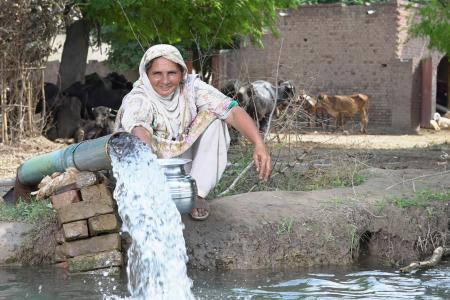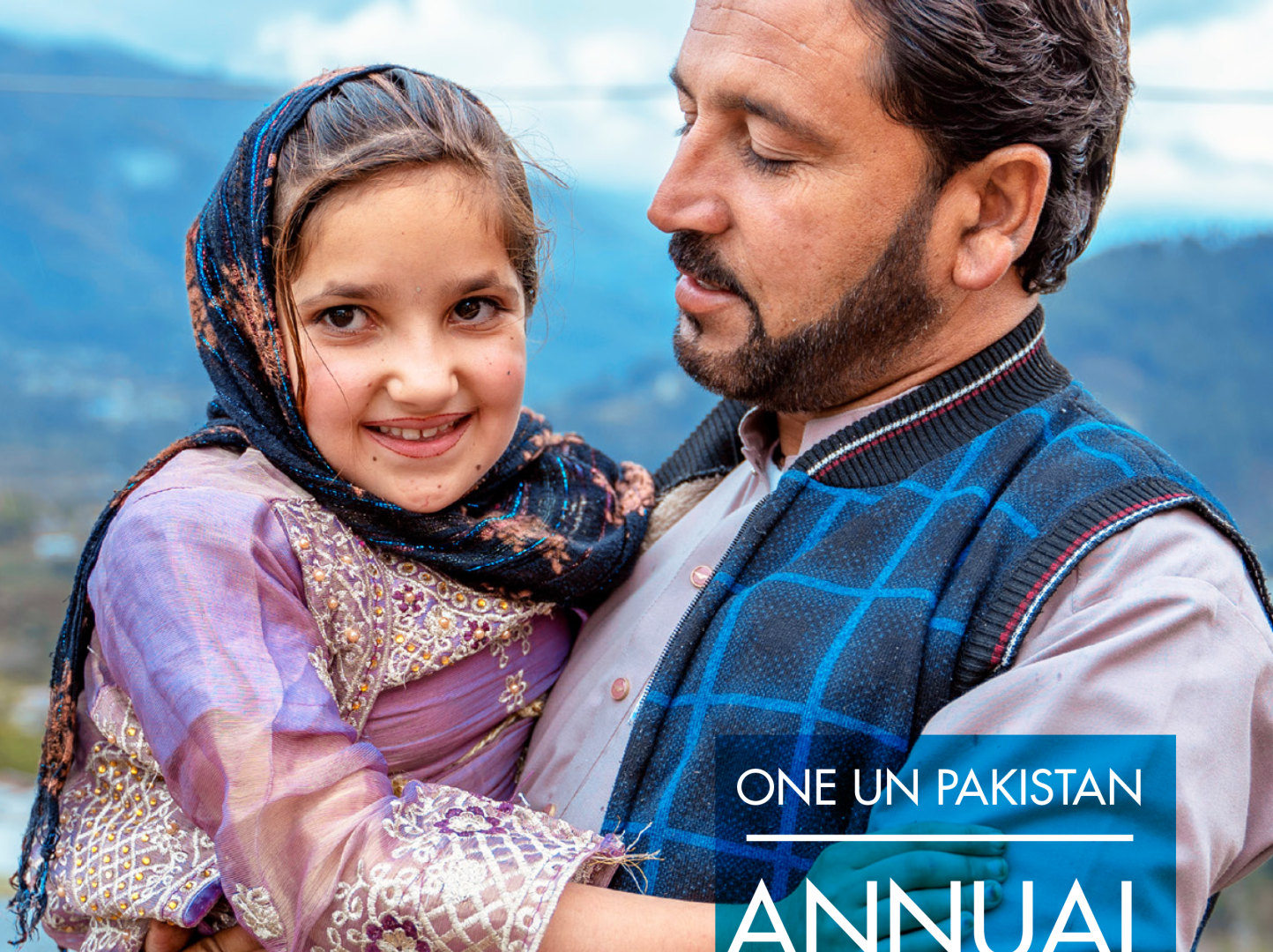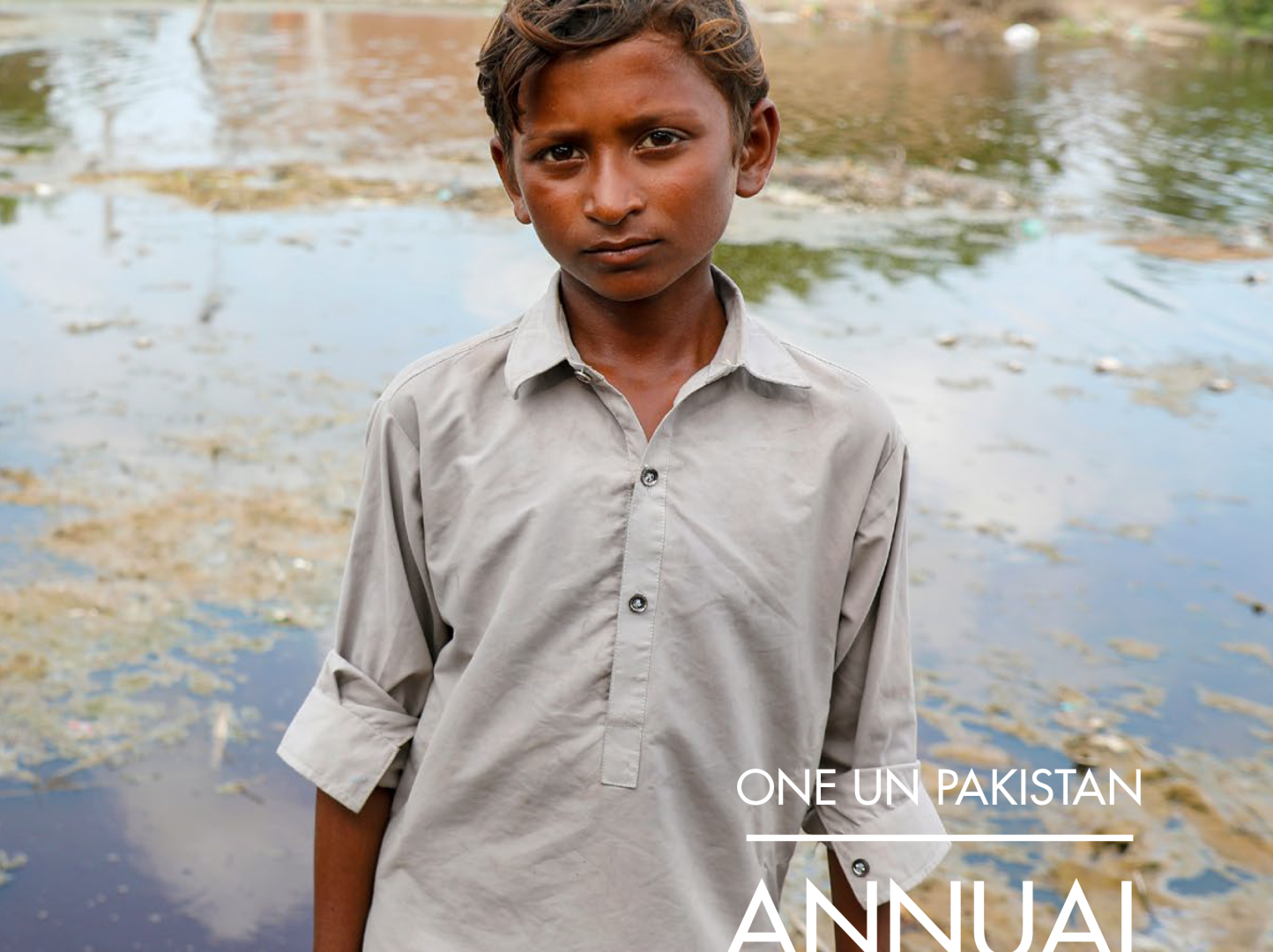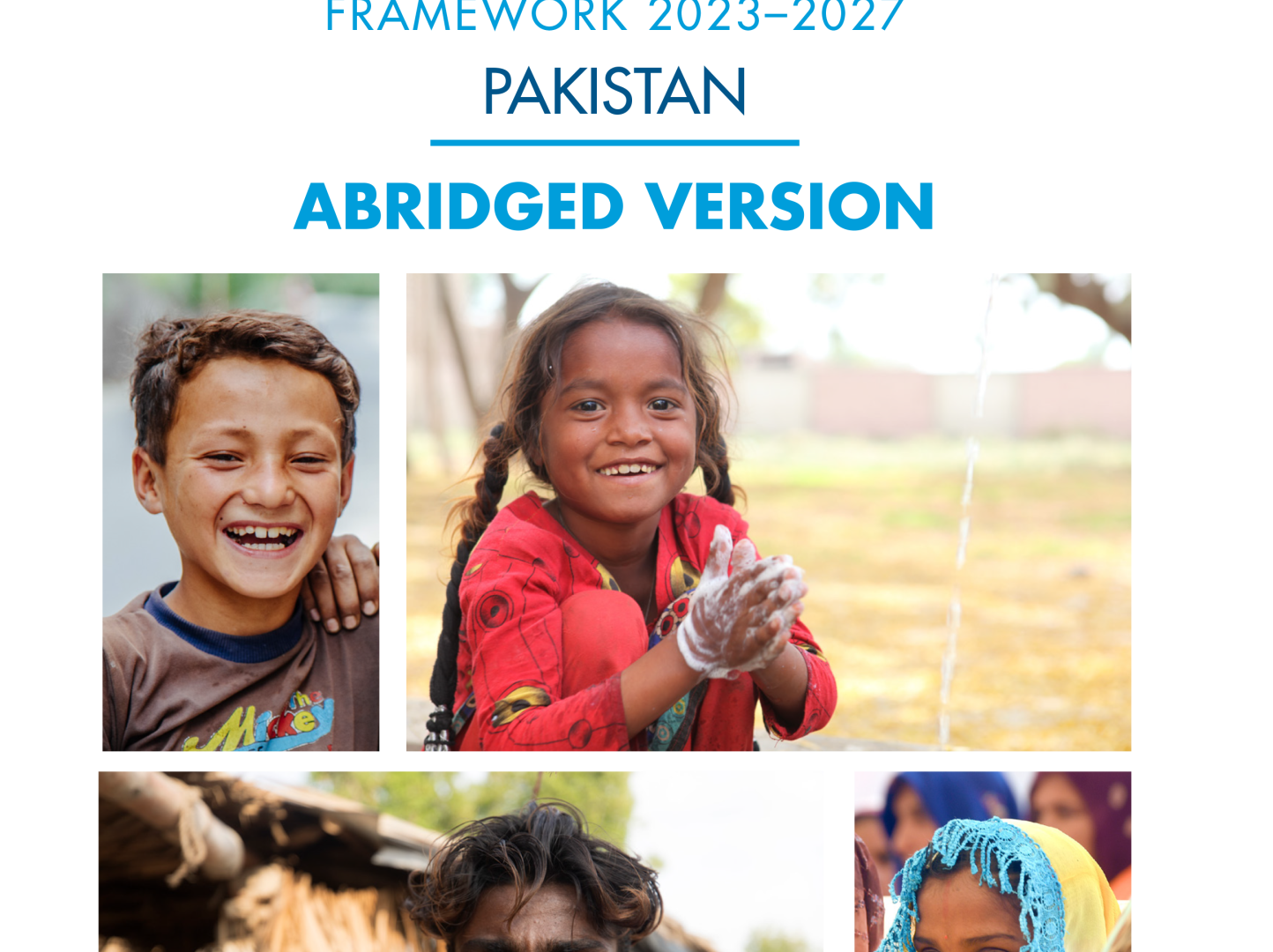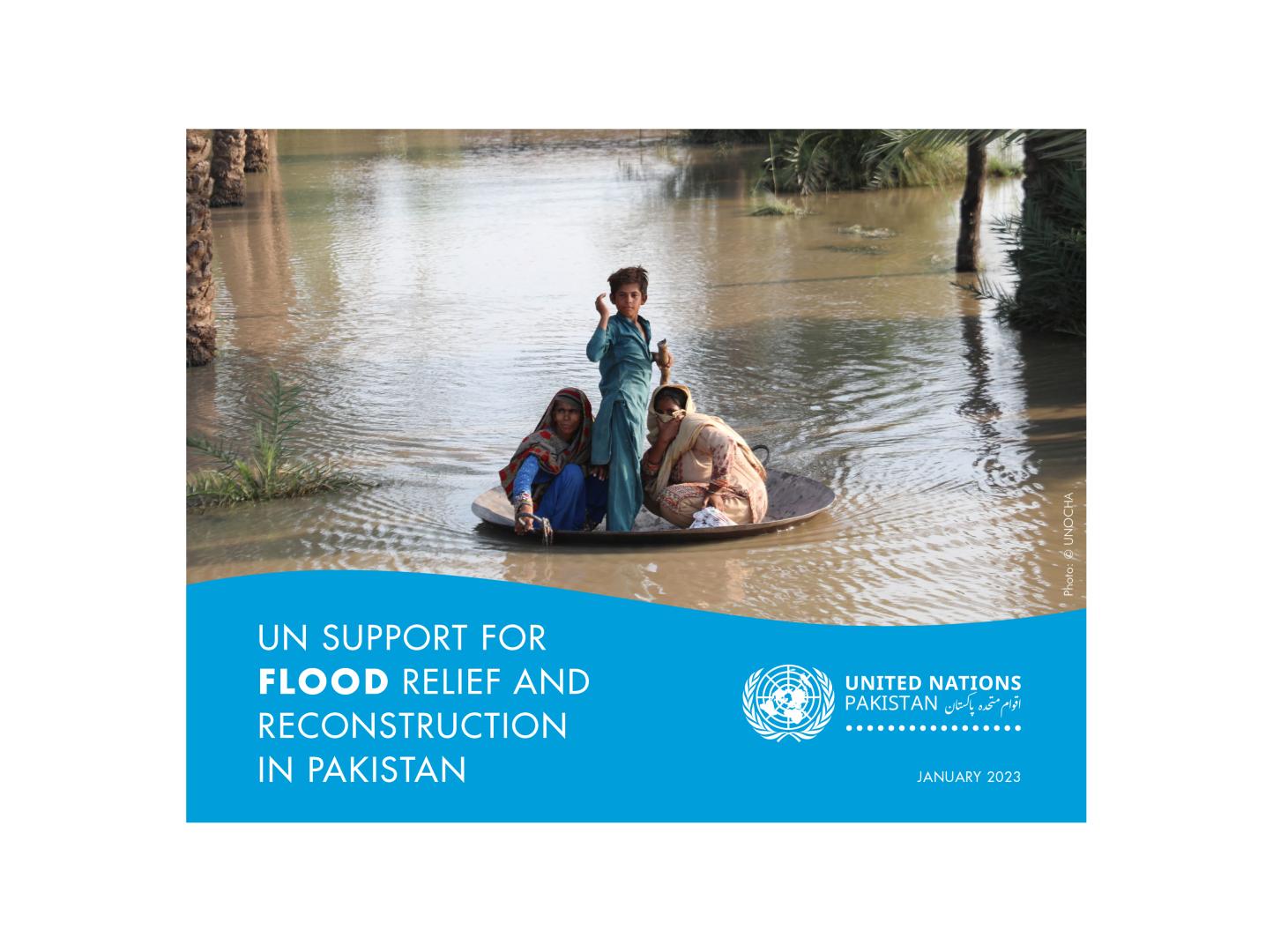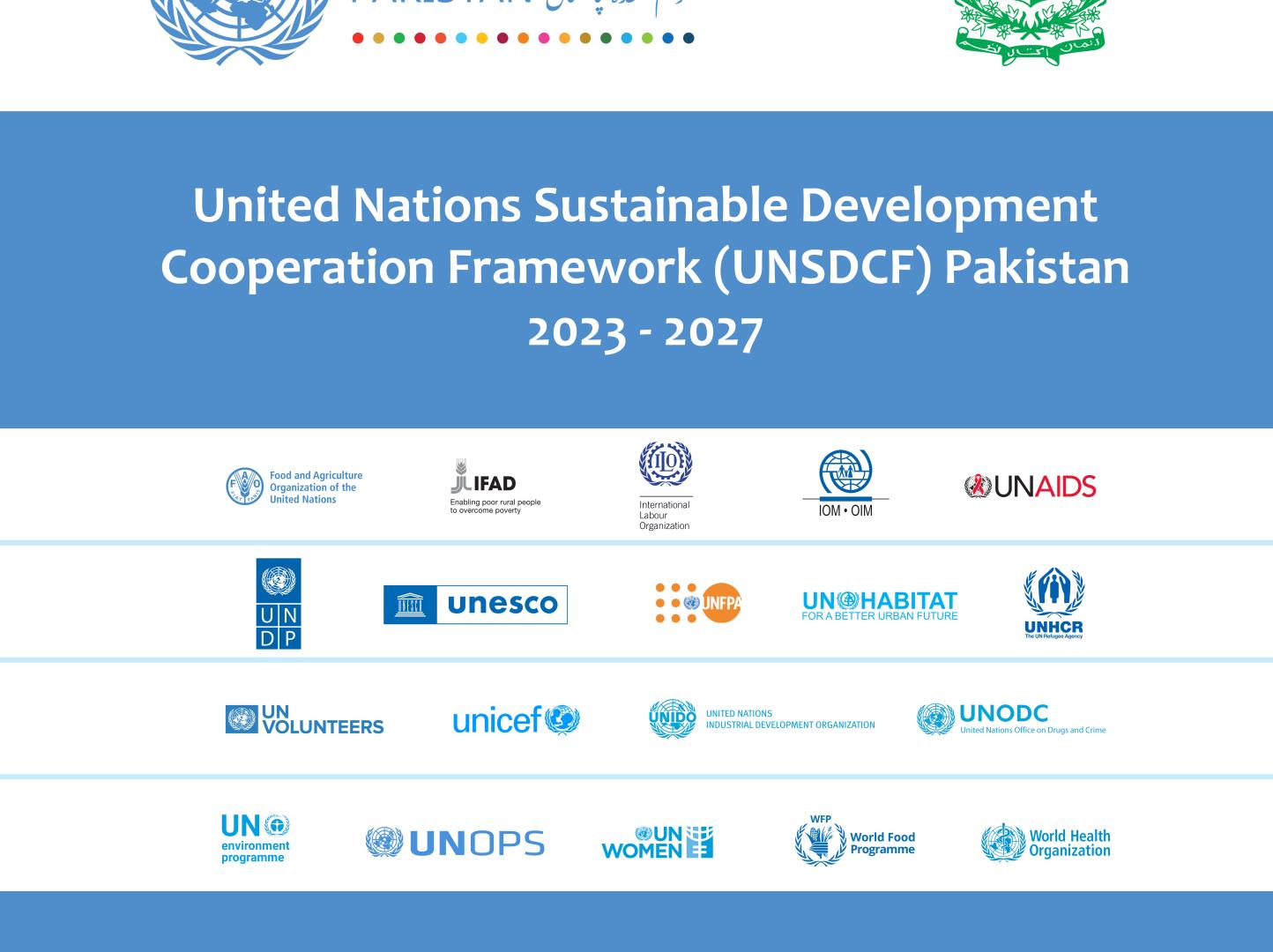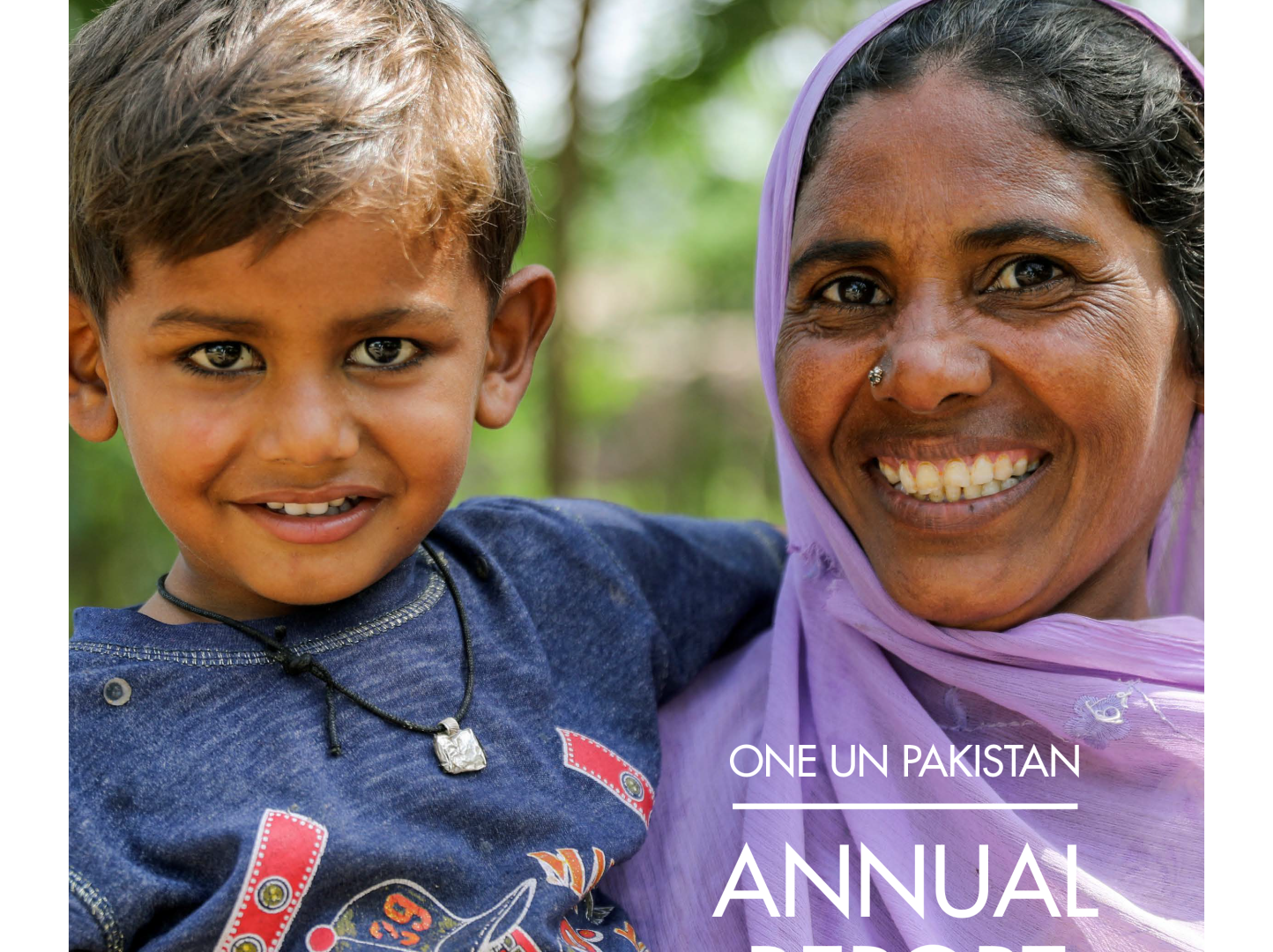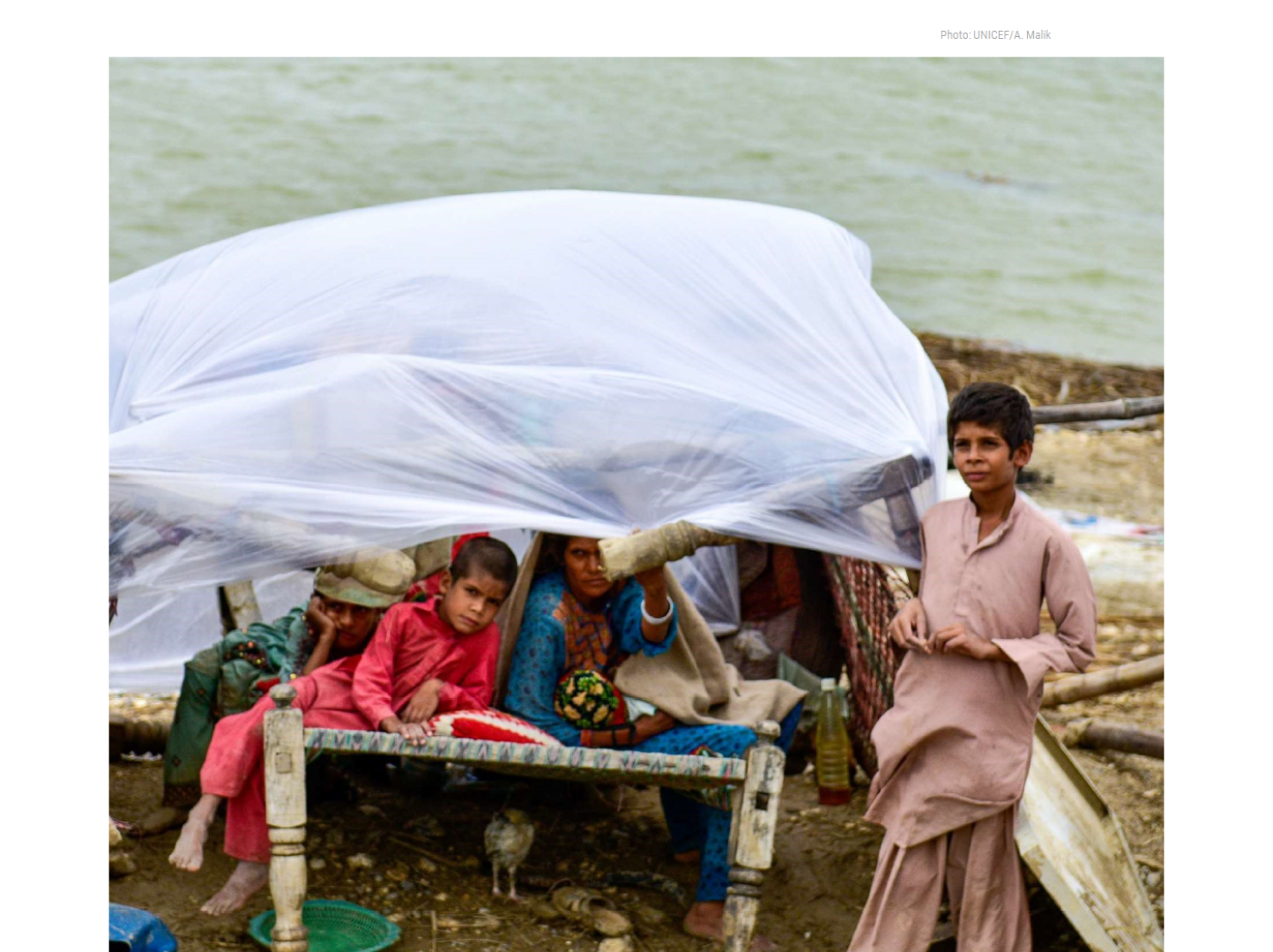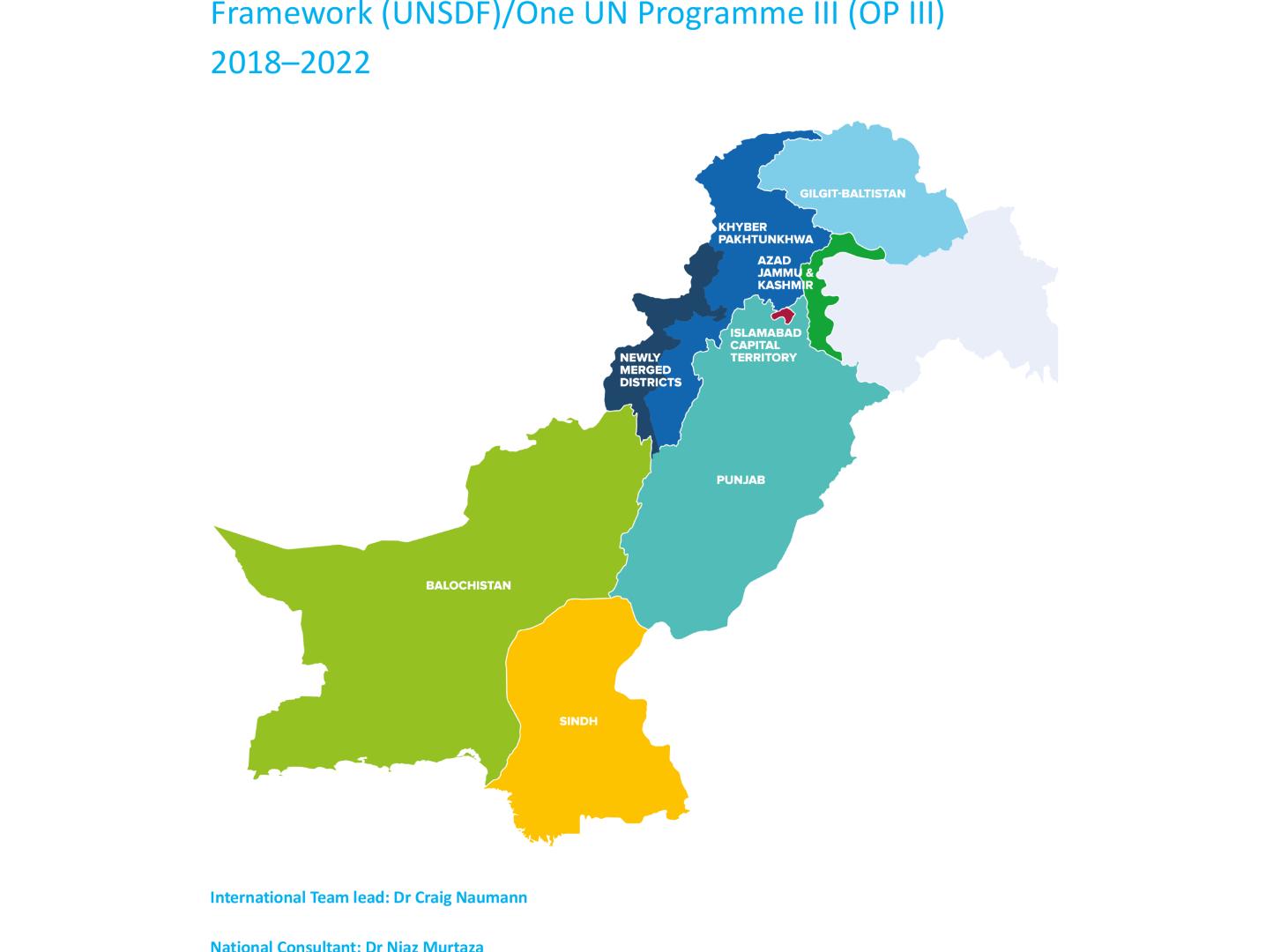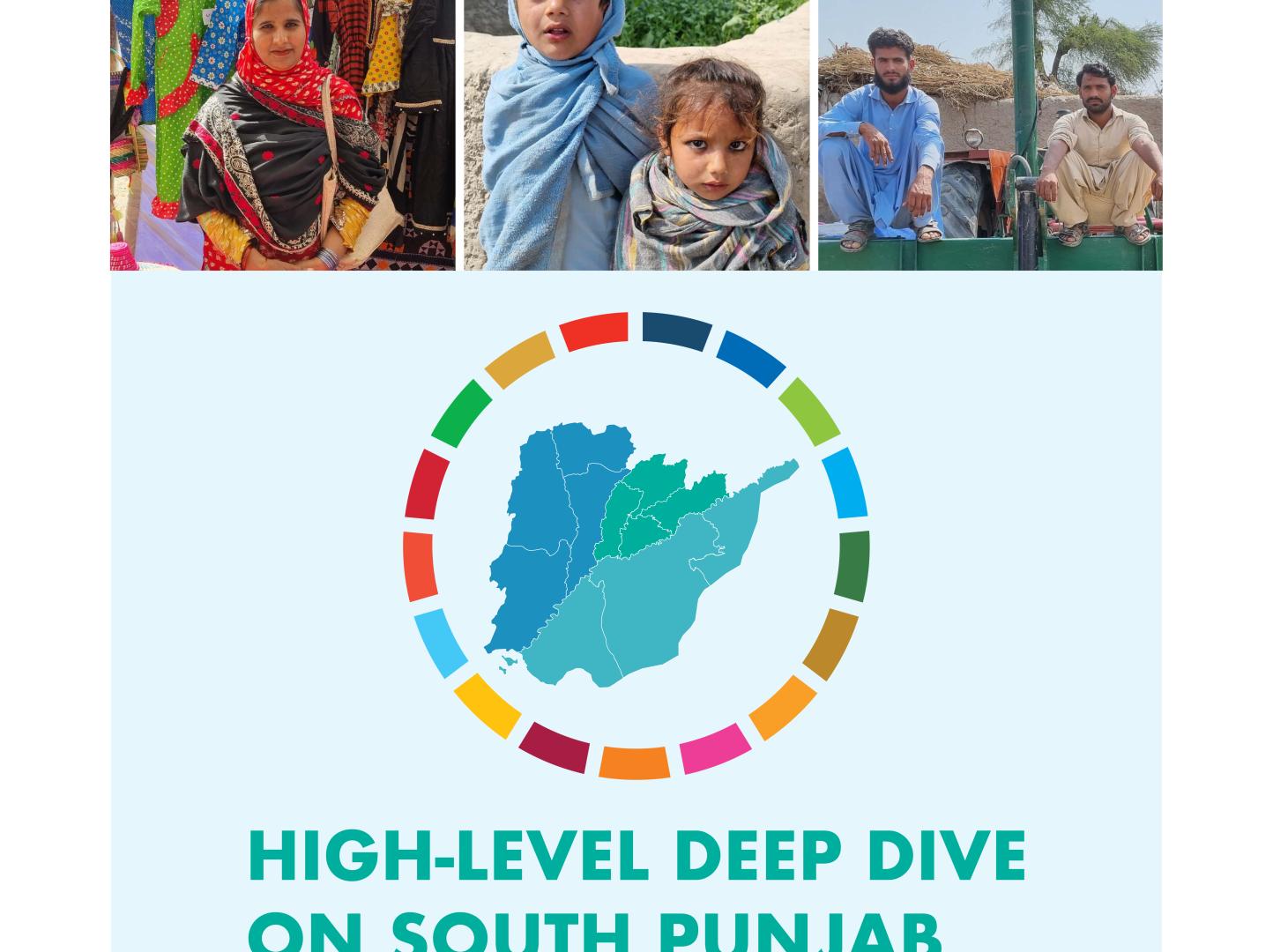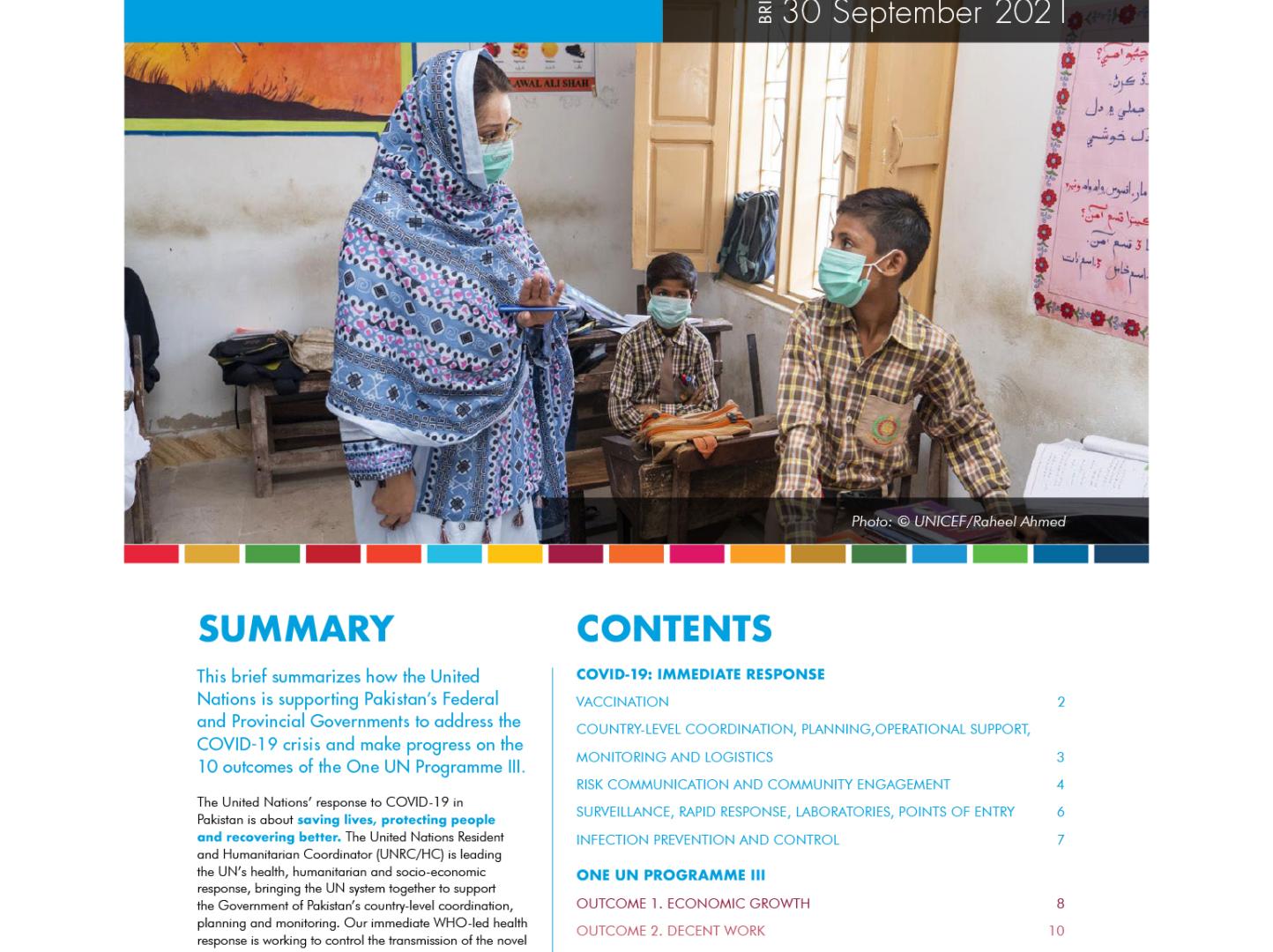Latest
Press Release
29 November 2024
Media Update-2: United Nations Pakistan, 25 November 2024
Learn more
Press Release
29 November 2024
Media Update: United Nations Pakistan, 28 November 2024
Learn more
Press Release
29 November 2024
Media Update: United Nations Pakistan, 25 November 2024
Learn more
Latest
The Sustainable Development Goals in Pakistan
Pakistan affirmed its commitment to the 2030 Agenda for Sustainable Development by adopting the Sustainable Development Goals (SDGs) as its own national development agenda through a unanimous National Assembly Resolution in 2016. Since then, the country has made considerable progress by mainstreaming these goals in national policies and strategies and developing an institutional framework for SDGs implementation in Pakistan. SDG support units have been established at federal and provincial levels with the planning institutions (Ministry of Planning Development and Special Initiatives and Provincial Planning and Development Departments) to guide SDGs implementation and monitoring it progress. In 2018, the Government designed and approved a National SDGs Framework that envisages a national vision to prioritize and localize SDGs. Localized provincial SDG Frameworks are being formulated. The focus of the government is on mainstreaming SDGs in planning processes, ensuring strong monitoring and reporting on SDGs, ensuring public financial allocations are aligned to SDGs and alternate financing modalities are being explored, and to benefit from use of technology to accelerate progress towards SDGs.
Publication
08 November 2022
United Nations Sustainable Development Cooperation Framework (UNSDCF) 2023-2027 for Pakistan
With this framework, the UN in Pakistan has prioritized five development outcomes to improve people’s lives in Pakistan, especially the lives of those at the greatest risk of being left behind. The UN will support Pakistan to move forward on its pathway towards sustainable development, on the understanding that:✓ If basic social services – including health, nutrition, water, sanitation and hygiene (WASH), education and social protection – are strengthened, there will be increased equal access to sustainable quality services for all.✓ If women, girls and transgender persons are empowered to reach their fullest potential, their human, social, economic and cultural rights will be fully protected and upheld, and they will have decision-making power over all aspects of their lives.✓ If the health of the Indus River Basin is restored and protected, and resources are equitably and efficiently used, the Indus will sustain a thriving civilization from its sources to the sea, and Pakistan will be much better equipped to adapt to climate change and mitigate its impact.✓ If there is sustainable and inclusive green economic growth and decent work, there will be equitable employment opportunities, enhanced productivity, a sustainable business environment and the realization of workers’ rights.✓ If inclusive, accountable and efficient governance systems are in place, they will provide equitable service delivery, affordable and accessible justice systems, and enable people to be aware of – and obtain – their rights.To download an abridged version: Click here
1 of 3
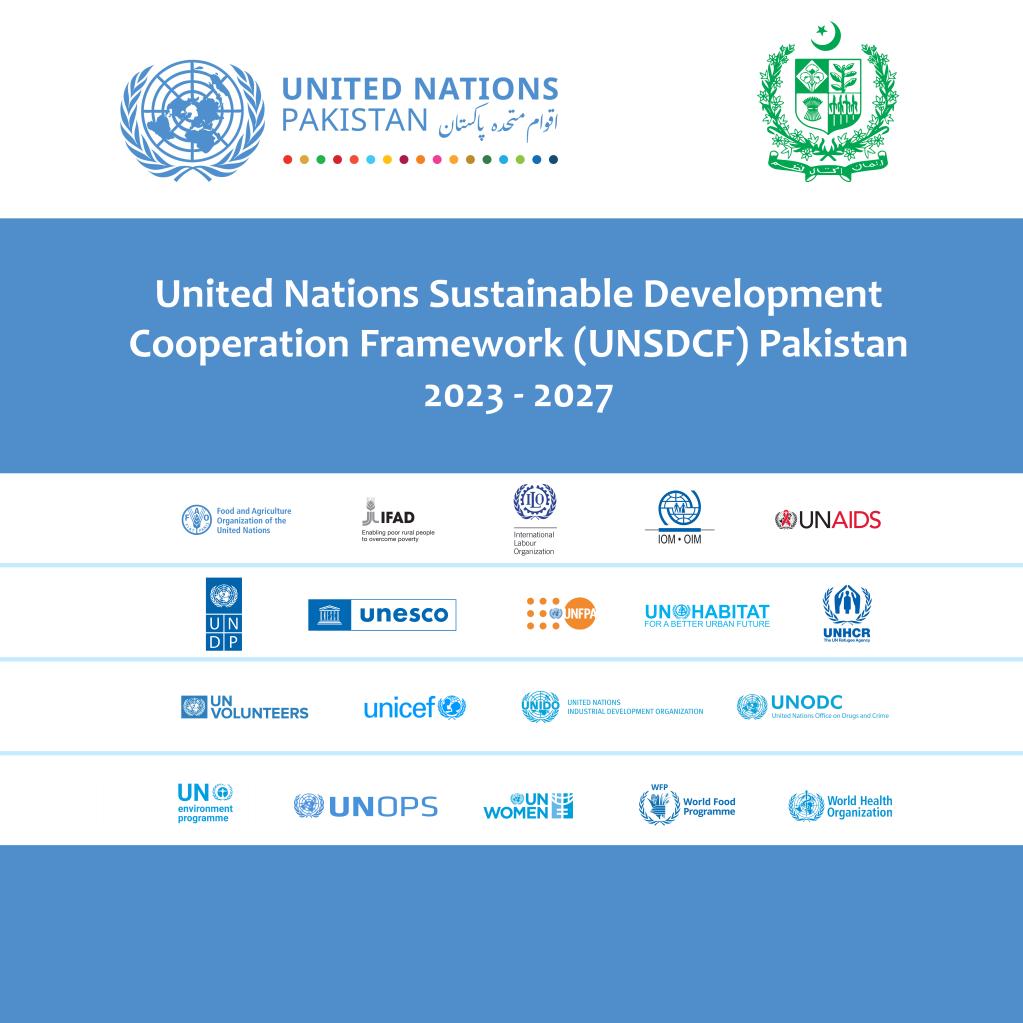
Story
18 June 2020
Pakistan: Further desert locust damage forecast in coming agricultural seasons
The Government of Pakistan’s preliminary estimate of monetary losses due to desert locusts over the two coming agricultural seasons in 2020 and 2021 may range from US$3.4 billion to $10.21 billion.
Locust damage has significantly affected many farmers already, with further significant locust damage forecast at the end of summer.
In late January, the Government of Pakistan declared the desert locust a national emergency and set up the National Action Plan for Desert Locust Control and Surveillance and a high-level National Locust Control Centre.
The Food and Agriculture Organization (FAO) is providing technical advice and procurement support to the Government for locust surveillance and control activities, including locust threat forecasts and control operation strategies.
FAO and the World Food Programme and partners, in coordination with the Government, will access needs in the worst-impacted districts, which have also experienced multiple shocks over the past 18 months, including drought, flash flooding, a cold wave and COVID-19.
The Government of Pakistan needs $372 million over the coming three years in additional funding to survey, control and recover from the locust damage.
FAO launched the Desert Locust Upsurge Global Response Plan 2020, which includes $12.5 million for Pakistan for crisis response, of which only $1.9 million has been funded.
More than 3 million people in Pakistan are facing severe acute food insecurity, with the situation particularly precarious in Balochistan.
It is estimated that approximately 34,000 households will need of emergency livelihood and food-security assistance due to crop losses. Many more people may be indirectly affected by crop losses leading to price rises in key commodities.
1 of 3

Story
16 June 2020
A Coordinated Response to Coronavirus
On Wednesday, 11 March 2020, the World Health Organization (WHO) characterized the coronavirus (COVID-19) viral disease a pandemic, but it is a pandemic that can be controlled. Coronavirus (COVID-19) is the infectious disease caused by the most recently discovered coronavirus.
Dr. Tedros Adhanom Ghebreyesus, who heads the UN agency, said, in his statement, “Let me be clear: describing this as a pandemic does not mean that countries should give up.”
The UN Secretary-General urged all countries to take a comprehensive approach tailored to their circumstances – with containment as the central pillar. COVID-19 is affecting thousands of people, impacting countries’ health systems and having widespread social and economic effects. The UN entities working on development, the United Nations Sustainable Development Group, are supporting countries in their preparedness and response plans.
This page convenes sources of information and guidance from the World Health Organization (WHO) and the United Nations (UN) regarding the current outbreak of novel coronavirus (COVID-19).
WHO is working closely with global experts, governments and partners to track the spread and to provide guidance to countries and individuals on measures to protect health and prevent the spread of this outbreak.
To stay up to date with the latest information, please visit:
United Nations Covid-19 Response: https://www.un.org/coronavirus
World Health Organization: https://www.who.int/emergencies/diseases/novel-coronavirus-2019
Latest news on the United Nations’ response: https://news.un.org/en/events/un-news-coverage-coronavirus-outbreak
WHO guidance for countries: https://www.who.int/emergencies/diseases/novel-coronavirus-2019/technical
Coronavirus (COVID-19) Situation: https://experience.arcgis.com/experience/685d0ace521648f8a5beeeee1b9125cd
1 of 3
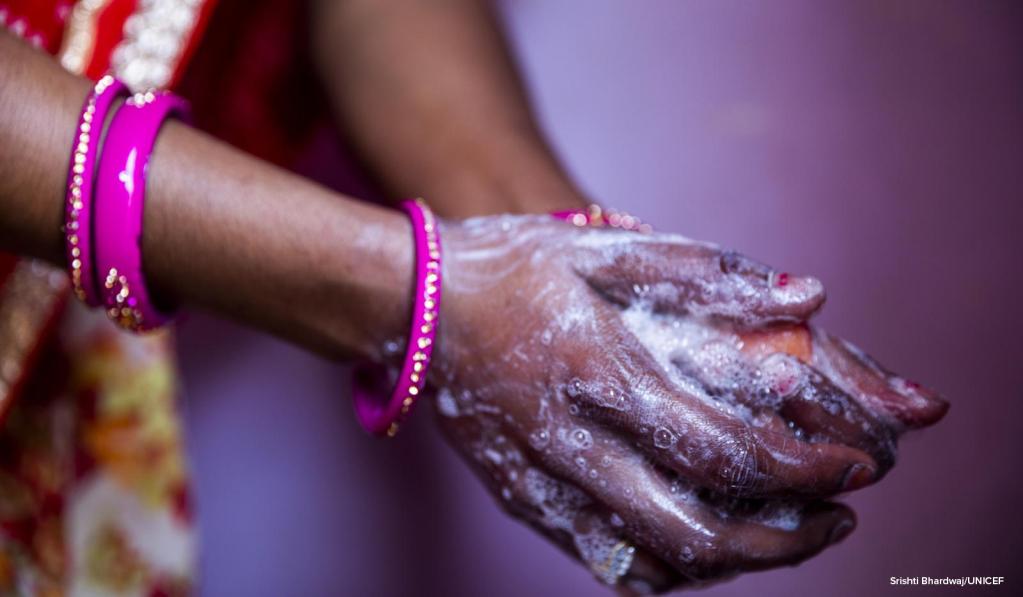
Story
13 November 2024
Pakistan’s Lady Health Workers: Offering a Lifeline of Health and Hope
As the sun rises over the desert of Tharparkar, the small village of Chehlar begins to wake up under a blistering sky. Despite the harsh heat, the people of Chehlar continue their daily routines. Parveen, 39, a mother of two, has already prepared a simple breakfast for her family and sent her daughters to school, which is miles away. Now, she gathers her materials, pamphlets, and tools for her session at the local health house.Today, in her role as a lady health worker, Parveen will meet with a group of women who have walked, some for over an hour along with their children, to address a diarrhea outbreak in the village. Poor sanitation and lack of clean water have made many sick, and there is a risk of acute malnutrition if the situation persists. Sitting in a circle in the stifling heat, the women listen attentively to Parveen.“It is important to wash hands frequently,” she advises. “If you don’t have access to clean water, boil it before drinking, and eat soft foods such as potatoes, boiled rice, and lentils to boost your immune system.” During the session, Parveen records the names of those needing further examination and prepares to refer them to the nearby health center for nutrition assistance. She then checks the children for malnutrition, using a simple tape measure around their upper arms. Today, an eight-month-old boy shows signs of severe undernourishment. His mother watches anxiously as Parveen gently reassures her, offering guidance on nutrition and registering the child for additional care.This is just one part of Parveen’s work. For 24 years, she has walked from home to home, teaching mothers how to prepare nutritious meals and reminding them about vaccinations.“At first, people didn’t trust me,” Parveen says. “But over time, they saw that I was here to help. Now they respect me, and they listen.”Lady health workers like Parveen are lifelines in their communities, bridging the gap between households and healthcare systems. They teach families essential health practices, guiding mothers on hygiene, and nutrition and preparing meals that improve family diets. Parveen’s expertise developed under the Community Management of Acute Malnutrition (CMAM) Surge programme, equips her to assess malnutrition, monitor pregnant women, and coach new mothers.The CMAM Surge approach, launched in Umerkot in 2021 and now expanded to Tharparkar, strengthens health systems in regions with high malnutrition rates. Funded by the European Union and implemented by WFP and Concern Worldwide, the programme provides tools and training to health workers like Parveen, who help detect malnutrition and link communities to critical care. This model, embedded across 12 health centers, enables responsive, effective care during seasonal surges of malnutrition caused by poverty, limited clean water, and high vulnerability to infections and drought. Since Pakistan’s Lady Health Worker (LHW) was launched in 1994, it has empowered community health champions in underserved areas, setting a global standard for grassroots health. LHWs like Parveen are crucial in spotting malnutrition early and establishing reliable referral networks to ensure families get timely help, especially during crises. In the past year, Parveen has referred 180 malnutrition cases to the Basic Health Unit in Chehlar, providing each with dedicated follow-up.Prepared for any emergency, from floods to disease outbreaks, Parveen carries her essential health kit — fetoscope, measuring tape, weight scale — delivering accurate, prompt care wherever needed.“This new way of doing things has really improved the system,” Parveen says.She glances at the women still gathered around her, their faces reflecting the heat but also hope. “Now, when we send someone to the health facility, they know who to go to, and they get the right care. The link between us and the hospital is much stronger.”— — Anam Abbas
1 of 5
Story
09 October 2024
Safe drinking water remains unavailable to nearly half of the people living in Pakistan
Waterborne diseases, and the resulting loss of life, are widespread and further compounded by the scarcity of water testing and monitoring resources – crucial to safeguarding drinking water. Working together over the past three years, UNOPS, the Korea International Cooperation Agency and the government of Pakistan have upgraded 45 laboratories across the country. We had old equipment and didn’t have the right equipment. It used to take around a week to test a water sample. But now, thanks to the new equipment UNOPS and KOICA have provided, we can test water samples quickly and get the results in just a few hours: Farah Naz - Senior Research Officer, Pakistan Council of Research in Water Resources, Islamabad Through the $4.5 million project, UNOPS procured and installed state-of-the-art laboratory equipment and upgraded the facilities of Public Health Engineering Departments, the Pakistan Environmental Protection Agency and the Pakistan Council for Research in Water Resources to ensure safe environments that support efficiency. Capacity at the water testing labs was developed via training for the Ministry of Climate Change and the rollout of a management information system. Remote areas in Khyber Pakhtunkhwa Province have never had local water testing facilities. To address this challenge, eight vehicles were remodelled to serve as mobile testing laboratories. “These mobile laboratories can travel to remote areas where there are no facilities to test the water quality. They can collect samples and test the water for pollutants. UNOPS has also provided us with management information system software to help make our operations paperless and more efficient,” said Shahid Sohail Khan, Secretary Public Health and Engineering Department, Khyber Pakhtunkhwa. The project is set to benefit over 60 million people across Pakistan.Story: UNOPS Pakistan
1 of 5
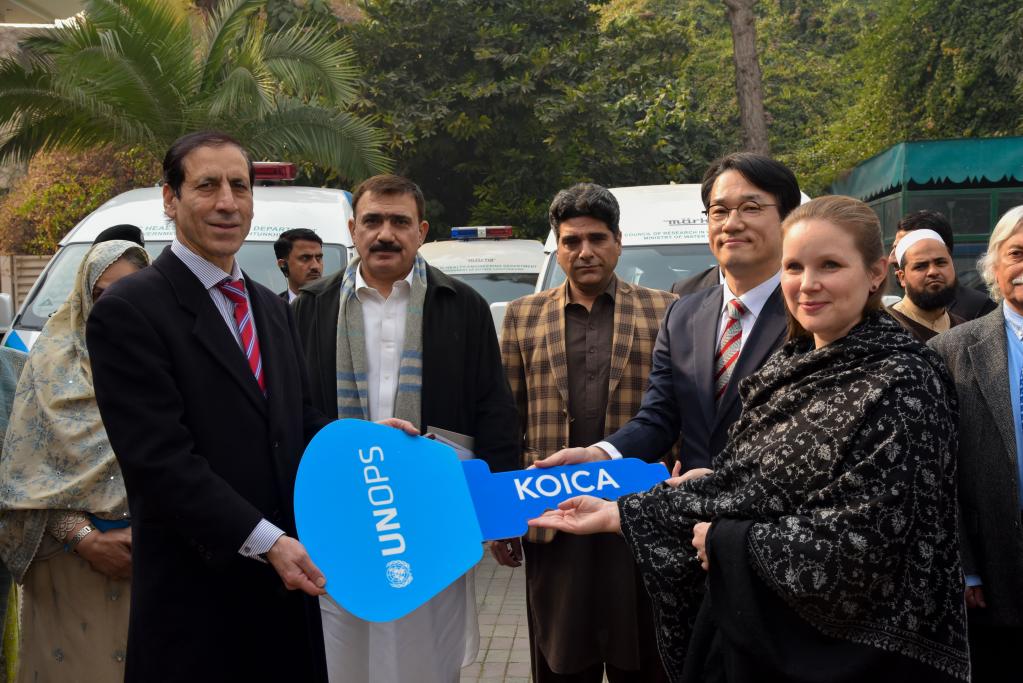
Story
06 August 2024
Building a Future Free from Child Trafficking: A Collaborative Effort!
By working together, we can build a future where no child is subjected to the horrors of trafficking and every child has the opportunity to thrive in a safe and supportive environment," emphasized Senator Ayesha Raza Farooq, Chairperson of the National Commission on Rights of Child (NCRC). "We have to act fast to ensure that no child is left behind," she added.In an unprecedented collaborative effort, the United Nations Office on Drugs and Crime (UNODC), the International Centre for Migration Policy Development (ICMPD), the International Labour Organization (ILO), the International Organization for Migration (IOM), and the Sustainable Social Development Organization (SSDO), alongside the Federal Investigation Agency (FIA), came together to commemorate World Day against Trafficking in Persons 2024 in Islamabad. The event, held under the global theme “Leave No Child Behind in the Fight Against Human Trafficking,” highlighted the collective commitment to protect children and reduce their vulnerability to trafficking.“Children are particularly vulnerable of trafficking for several reasons, including poverty, lack of access to education, humanitarian crises or lack of support networks”, said Uqbaan Khan, one of the student while talking to FIA in the margins of the commemoration of the TIP Day. Many passionate students from the National University of Moder-in Languages (NUML) Rawalpindi shared powerful messages to raise awareness. Their voices added a vibrant and inspiring dimension to the day's activities, emphasizing the urgency of protecting children from trafficking. https://fb.watch/tFBvdM8EIV/?mibextid=w8EBqM Approximately 100 participants from across Pakistan joined to discuss the urgent issue of child trafficking and emphasize the protection of children’s rights. Children represent a significant proportion of trafficking victims globally, with girls disproportionately affected. Rising inequalities and globalization have fueled complex trafficking networks, further exposing children to exploitation via online platforms.The event aimed to raise awareness about the prevalence and impact of child trafficking in Pakistan while highlighting the collaborative efforts of various organizations. National partners and stakeholders were recognized for their significant contributions to combating human trafficking.Ms Shahida Gilani read the message of UNODC Executive Director , “This year’s theme focuses on child victims, which have tripled over the past 15 years. According to UNODC’s data, globally, children account for one-third of trafficking victims, suffering unspeakable abuse.”While the Director ILO emphasized the urgent need to combat human trafficking, particularly its impact on children. “With 3.3 million children trafficked worldwide, it is crucial for state systems to adopt integrated approaches that prioritize child protection”, the Senior Programme Coordinator at IOM, highlighted the importance of stronger partnerships and improved migration management.The Executive Director of SSDO and the Head of Office at ICMPD both emphasized the need for a systematic approach to victim identification and support. They highlighted the importance of increased prosecutions, better labor inspections, and enhanced public awareness to effectively address and prevent trafficking. They also underscored the necessity of collaborative frameworks to combat human trafficking, with the ultimate goal of ensuring that no child falls through the cracks and that every child is protected from exploitation and harm.As the main stakeholders in the efforts by international agencies and civil society, government representatives Director General FIA Mr. Ahmad Ishaque Jahangir (PSP) and Abbas Ahsan, Additional Director General of FIA, spoke on the TIP Day. Director General FIA added, “Human trafficking, particularly child trafficking, is a serious human rights violation that demands our unwavering attention and action. Our work is significantly enhanced through collaboration with our esteemed partners.” And “Our society and law enforcement must acknowledge what constitutes trafficking, its prevalence in Pakistan, and its impact on children,” emphasized Additional Director General, underscoring the serious nature of child trafficking.
1 of 5
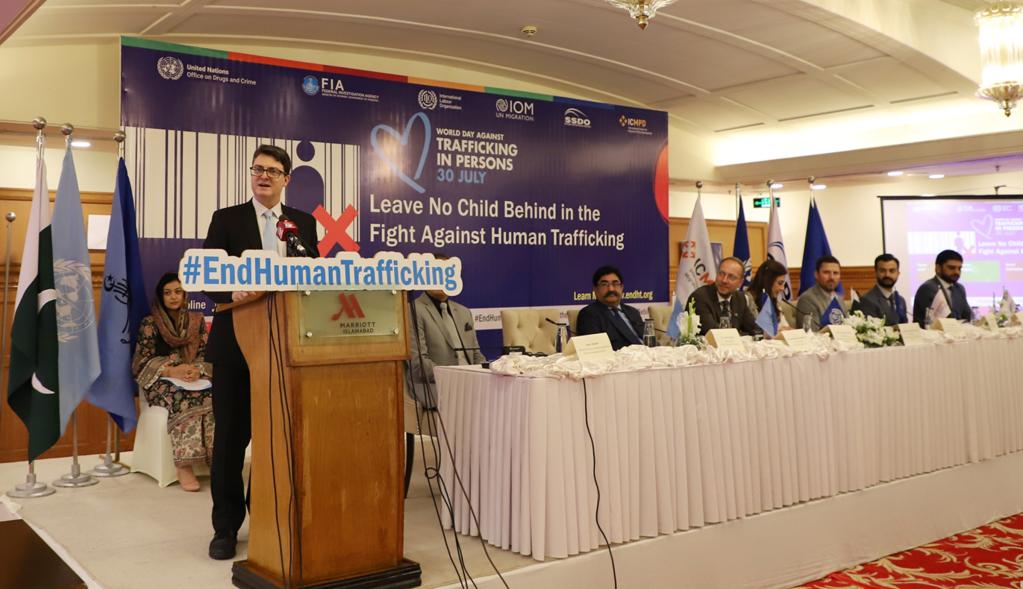
Story
21 May 2024
Empowering Lives: UNDP's Food Security Initiative for People Living with HIV in Pakistan
Recognizing this critical need, the United Nations Development Programme (UNDP) has taken a significant step forward. Since 2021, UNDP has been actively collaborating with the Association of Persons Living with HIV (APLHIV), with support from the Global Fund to Fight AIDS, TB, and Malaria. Their collaborative effort includes a vital food package program specifically designed to empower PLHIV in Pakistan by tackling food insecurity head-on.
The rationale behind UNDP's food distribution program is clear: for HIV positive individuals, maintaining adequate nutrition is critical to support adherence and tolerance to the lifesaving HIV treatment medication – antiretrovirals. Further, food insecurity can increase the progression of AIDS-related illnesses, reduce the capacity of HIV positive individuals to work and contribute to family and community security. In Pakistan, access to regular, nutritious food remains a significant challenge for people living with HIV due to various socio-economic factors.
UNDP's food distribution process involves providing four packages annually – one for each quarter of the year. These food packages are curated carefully, containing essential components necessary for a balanced diet such as flour, rice, milk, pulses, and cooking oil. As part of our quality assurance procedures, all items included in the food package undergo thorough lab testing to ensure their quality prior to dispatch. As of 2024, UNDP has distributed more than 18,000 food packages to PLHIV across all four provinces of Pakistan, in addition to the federal level. Distribution is as follows: Balochistan: 538 packs, Khyber Pakhtunkhwa (KPK) 3,249 packs, Punjab: 3,868 packs, Sindh: 8,932 packs and Federal: 1,422 packs.
These food packages serve as more than just a source of nutrition; they also bring a sense of solidarity and support. Ms. Ruqaiya, a beneficiary from Islamabad, expressed, “It’s not just a food package, it’s a package of hope and happiness for us.” UNDPs commitment to providing food assistance underscores its dedication to addressing the multifaceted needs of PL HIV in Pakistan.Amid ongoing challenges, including the socio-economic repercussions, UNDP remains steadfast in its commitment to supporting PLHIV in Pakistan. Through strategic partnerships, innovative interventions, and a holistic approach to development, UNDP continues to make meaningful strides towards achieving the Sustainable Development Goals and leaving no one behind. As UNDP's food distribution efforts continue and its commitment to strengthening HIV prevention and response persists, UNDP is not only saving lives but also building a more resilient and inclusive society for all. Story: UNDP Pakistan
The rationale behind UNDP's food distribution program is clear: for HIV positive individuals, maintaining adequate nutrition is critical to support adherence and tolerance to the lifesaving HIV treatment medication – antiretrovirals. Further, food insecurity can increase the progression of AIDS-related illnesses, reduce the capacity of HIV positive individuals to work and contribute to family and community security. In Pakistan, access to regular, nutritious food remains a significant challenge for people living with HIV due to various socio-economic factors.
UNDP's food distribution process involves providing four packages annually – one for each quarter of the year. These food packages are curated carefully, containing essential components necessary for a balanced diet such as flour, rice, milk, pulses, and cooking oil. As part of our quality assurance procedures, all items included in the food package undergo thorough lab testing to ensure their quality prior to dispatch. As of 2024, UNDP has distributed more than 18,000 food packages to PLHIV across all four provinces of Pakistan, in addition to the federal level. Distribution is as follows: Balochistan: 538 packs, Khyber Pakhtunkhwa (KPK) 3,249 packs, Punjab: 3,868 packs, Sindh: 8,932 packs and Federal: 1,422 packs.
These food packages serve as more than just a source of nutrition; they also bring a sense of solidarity and support. Ms. Ruqaiya, a beneficiary from Islamabad, expressed, “It’s not just a food package, it’s a package of hope and happiness for us.” UNDPs commitment to providing food assistance underscores its dedication to addressing the multifaceted needs of PL HIV in Pakistan.Amid ongoing challenges, including the socio-economic repercussions, UNDP remains steadfast in its commitment to supporting PLHIV in Pakistan. Through strategic partnerships, innovative interventions, and a holistic approach to development, UNDP continues to make meaningful strides towards achieving the Sustainable Development Goals and leaving no one behind. As UNDP's food distribution efforts continue and its commitment to strengthening HIV prevention and response persists, UNDP is not only saving lives but also building a more resilient and inclusive society for all. Story: UNDP Pakistan
1 of 5
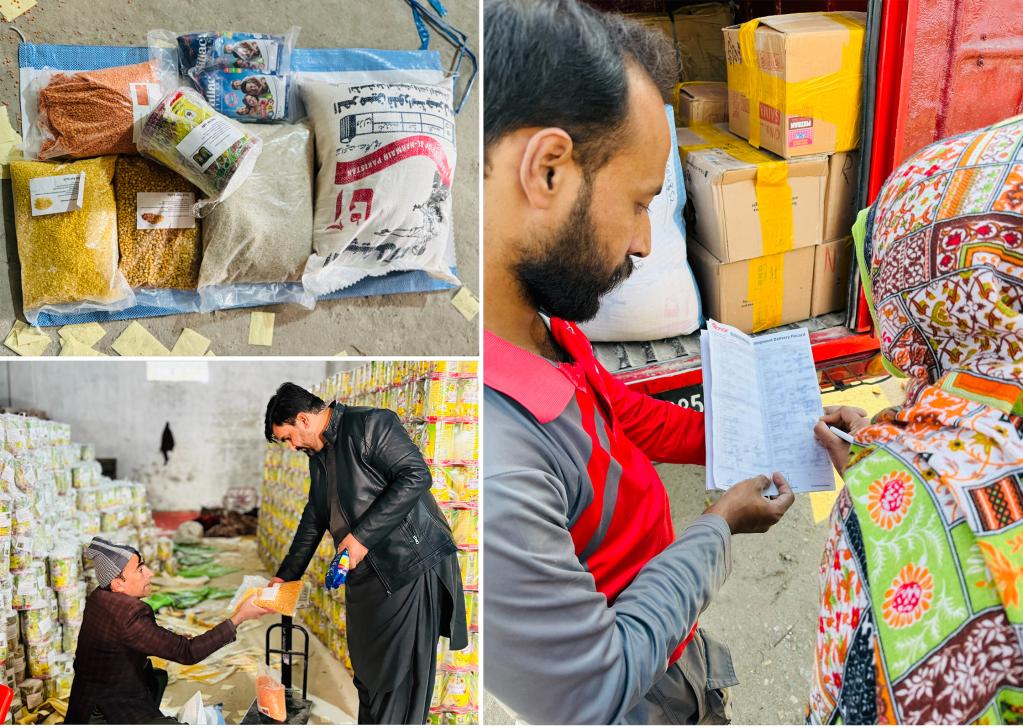
Story
25 January 2024
Pakistan's farmers feel the (solar) power
In the photo (above), a smallholder farmer from Bhagwela, Rahim Yar Khan, in Punjab province, inspects her solar tube well, a type of water pumping system that utilizes solar energy to bring up water from underground sources, such as wells or boreholes. It is an eco-friendly and cost-effective alternative to the diesel or mains electricity-powered pumps commonly used in agricultural irrigation.
With the solar-powered tube well irrigating her farmland, the farmer has cut costs and improved her crop yields. She is one of the nearly 500 women and men engaged in farming and running small enterprises in the provinces of Punjab and Sindh who UNIDO has helped apply renewable energy solutions for productive uses. The National Rural Support Programme (NRSP), a leading microfinance and development organization in Pakistan, provides loans for the procurement and installation of renewable energy solutions, and UNIDO covers the interest payments so that the loans are interest-free.
Another farmer, Kaneez Fatima, from the Sargodha district in Punjab, expressed her thanks. "I own a small piece of land, and access to water and electricity is always a problem. I received UNIDO's assistance through the NRSP - an interest-free loan to purchase a 2KW solar panel to run a tube well to irrigate my land. The installation process was extremely smooth, according to the land irrigation needs and water level."
The electricity costs for beneficiaries have drastically dipped. A post-installation impact survey conducted by the NRSP found that 80% of respondents reported savings of of up to 15,000 Pakistani rupees (around €50) a month, with the other 20% saving even more.
Small farmers and entrepreneurs have been suffering from fuel price hikes in recent times. Agriculture and small and medium-sized enterprises (SMEs) are the mainstays of Pakistan's economy, providing jobs for around two-thirds of the population.
Rashid Bajwa, CEO of the NRSP, laments the impact of the enegy crisis on the economy. "The majority of our population generates income that is barely enough to meet their needs and the situation is getting worse," says Bajwa. "We need to adapt and improvise, and alternative or green energy just might be the solution that will enable our SME sector to sustain and grow."
The farms and businesses supported by UNIDO have not only reduced costs by switching from diesel, they are also helping save the climate. With a capacity to produce 1,825 MWh of clean energy a year, the project beneficiaries will be able to avoid more than 800 metric tons of CO2 emissions annually.
Shah Jahan Mirza, Managing Director of the government agency, the Private Power and Infrastructure Board, commended UNIDO for introducing renewable energy technogology to smallholder farmers and small enterprises in Punjab and Sindh provinces. "These rural communities generally don't have funding to finance these systems. There are also doubts and misconceptions about these technologies, i.e. they are not reliable and very costly, or may not help. Providing interest-free loans is a breakthrough. UNIDO has taken a lead in this which will go a long way, as the people have now started using this technology. "
The UNIDO initiative is part of a bigger project, Sustainable Energy Initiative for Industries in Pakistan, funded by the Global Environment Facility (GEF). Collaborating with public and private partners, UNIDO has facilitated investments in energy efficiency and renewable energy in 50 industrial units. In addition, UNIDO has placed significant emphasis on capacity building, and has trained more than 625 professionals, including 30 women, in energy management systems and energy optimization.
The project has yielded significant results, implementing more than 12MW of renewable energy projects in the industrial sector, and thereby reducing over 17,000 metric tons of CO2 emissions.
Further reading: Sustainable Energy Initiative for Industries in Pakistan
WRITTEN BY: Charles Arthur - UNIDO
1 of 5
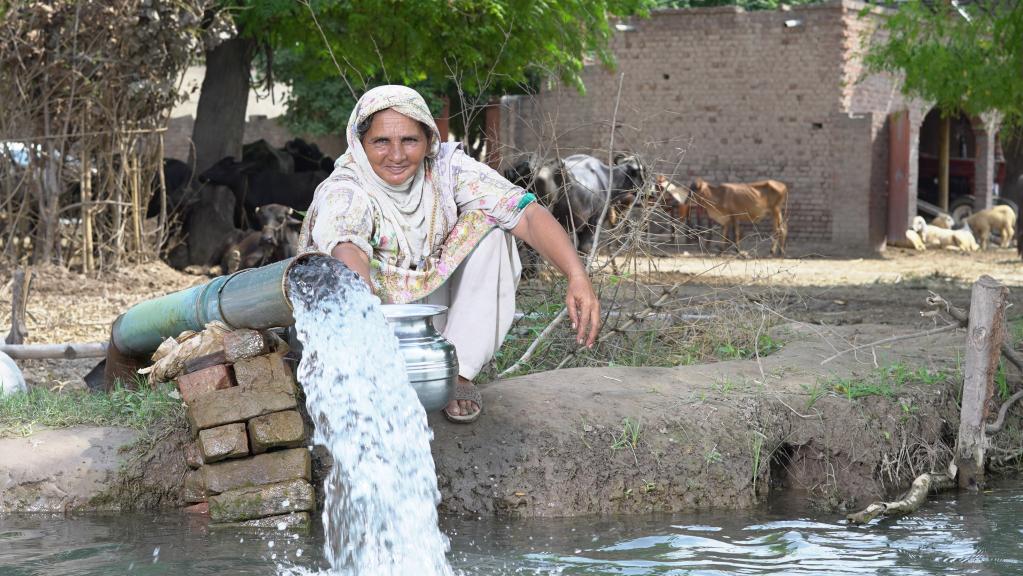
Press Release
29 November 2024
Media Update: United Nations Pakistan, 28 November 2024
ILOPRESS RELEASEWage inequality has declined in two-thirds of countries worldwide since start of 21st CenturyGlobal real average wage growth has started to rise again as inflation progressively eases. Despite these positive outcomes, high levels of wage inequality remain, making it a pressing policy issue, ILO report finds.GENEVA (ILO News) – A new report from the International Labour Organization (ILO) reveals that wage inequality has decreased in about two-thirds of all countries since 2000. Despite this positive trend, significant wage differentials persist worldwide. The Global Wage Report 2024-25: is wage inequality decreasing globally?, finds that since the early 2000’s, on average, wage inequality, which compares the wages of high and low wage earners, decreased in many countries at an average rate that ranged from 0.5 to 1.7 per cent annually, depending on the measure used. The most significant decreases occured among low-income countries where the average annual decrease ranged from 3.2 to 9.6 per cent in the past two decades.Wage inequality is declining at a slower pace in wealthier countries, shrinking annually between 0.3 and 1.3 per cent in upper-middle-income-countries, and between 0.3 to 0.7 per cent in high-income countries. Moreover, even though wage inequality narrowed overall, decreases were more significant among wage workers at the upper end of the pay scale.Real wages rose globally but regional differences persistThe report also finds that global wages have been growing faster than inflation in recent times. In 2023, global real wages grew by 1.8 per cent with projections reaching 2.7 per cent growth for 2024, the highest increase in more than15 years. Such positive outcomes mark a notable recovery when compared to the negative global wage growth, of -0.9 per cent, observed in 2022, a period when high inflation rates outpaced nominal wage growth.However, wage growth has been uneven across regions, with emerging economies experiencing stronger growth than advanced economies, the report finds. While advanced G20 economies registered a decline in real wages for two consecutive years (−2.8 per cent in 2022 and −0.5 per cent in 2023), real wage growth remained positive for both years in emerging G20 economies (1.8 per cent in 2022 and 6.0 per cent in 2023).Regional wage growth patterns varied considerably. Wage workers in Asia and the Pacific, Central and Western Asia, and Eastern Europe experienced their real wage increases at a faster rate than those in other parts of the world, according to the report."The return to positive real wage growth is a welcome development," said ILO Director-General, Gilbert F. Houngbo. "However, we must not forget that millions of workers and their families continue to suffer from the cost-of-living crisis that has eroded their living standards and that wage disparities between and within countries remain unacceptably high."Persistent Wage InequalityDespite recent progress high levels of wage inequality remain a pressing issue. The report shows that globally, the lowest-paid 10 per cent of workers earn just 0.5 per cent of the global wage bill, while the highest-paid 10 per cent earn nearly 38 per cent of this wage bill. Wage inequality is the highest in low-income countries, with close to 22 per cent of wage workers there classified as low-paid.Women and wage workers in the informal economy are more likely to be among the lowest paid. This finding reinforces the need for targeted actions to close wage and employment gaps and ensure fair wages for all wage workers.Wage inequality is relevant in all countries and regions. Globally, however, one in every three workers is a non-wage worker. In most low- and middle-income countries the majority are self-employed workers, who can only find opportunities to earn a living in the informal economy. It is for this reason that the report broadens its analysis to include the self-employed in the case of low- and middle- income countries. As a result, measured labour income inequality increases significantly in these regions, as compared to that measured based only on wages from wage workers."National strategies to reduce inequalities require strengthening wage policies and institutions," says Giulia De Lazzari, ILO Economist and one of the main authors of the report. "But equally important is to design policies that promote productivity, decent work and the formalization of the informal economy."Strengthening Wage Policies to Reduce InequalityThe study emphasizes the need for targeted policies to foster inclusive economic growth.The report concludes that reducing wage inequality requires both strong wage policies and structural support for equitable growth. By addressing these challenges countries can make real progress toward reducing wage gaps and promoting fair, sustainable, economic growth for workers worldwide.Key ILO recommendations include:Setting wages through social dialogue: wages should be set and adjusted through collective bargaining or agreed minimum wage systems involving governments, workers and employers.Taking an informed approach: wage-setting should take into account both the needs of workers and their families and economic factors.Promoting equality, and equal opportunity of treatment and outcomes: wage policies should support gender equality, equity and non-discrimination.Using strong data: decisions should be based on reliable data and statistics.Addressing root causes of low pay: national policies should reflect each country’s specific context and address the causes of low pay such as informality, low productivity and the under-valuing of jobs in sectors such as the care economy. اکیسویں صدی کے آغاز سے دنیا بھر کے دو تہائی ممالک میں اجرت کی عدم مساوات میں کمی آئی ہے۔افراط زر میں بتدریج کمی آنے کیساتھ، عالمی سطح پر حقیقی اوسط اجرت کی نمو میں اضافہ ہو رہا ہے۔ ان مثبت نتائج کے باوجود، اجرتوں میں عدم مساوات کی بلند سطح برقرار ہے، جو اسے پالیسی کا ایک اہم مسئلہ بناتی ہے - عالمی ادارہ محنت کی رپورٹ کا انکشاف جنیوا (آئی ایل او نیوز) - عالمی ادارہ محنت (آئی ایل او) کی ایک نئی رپورٹ سے ظاہر ہوتا ہے کہ سال 2000 کے بعد سے دنیا کے تقریباً دو تہائی ممالک میں اجرت کی عدم مساوات میں کمی آئی ہے۔ اس مثبت رجحان کے باوجود، پوری دنیا میں تنخواہوں میں بڑا فرق ابھی بھی برقرار ہے۔ عالمی اجرت کی رپورٹ برائے سال 2024-2025: کیا عالمی اجرت کا فرق کم ہو رہا ہے؟، سے پتہ چلا ہے کہ اجرت کی عدم مساوات، جو زیادہ اور کم اجرت حاصل کرنے والے کارکنان کی اجرتوں کا موازنہ کرتی ہے، استعمال شدہ پیمانوں کے حساب سے سال 2000 کی دہائی کے اوائل سے بہت سے ممالک میں سالانہ اوسطاً 0.5 سے 1.7 فیصد کی شرح سے کم ہوئی ہے۔۔ سب سے نمایاں کمی کم آمدنی والے ممالک میں دیکھنے میں آئی، جہاں گزشتہ دو دہائیوں میں اوسط سالانہ کمی 3.2 اور 9.6 فیصد کے درمیان پائی گئی ۔امیر ممالک میں اجرت کی عدم مساوات کا فرق نسبتاً آہستہ آہستہ کم ہو رہا ہے، جہاں اعلیٰ متوسط آمدنی والے ممالک میں سالانہ 0.3 اور 1.3 فیصد کے درمیان ، اور زیادہ آمدنی والے ممالک میں 0.3 اور 0.7 فیصد کے درمیان کمی دیکھی گئی۔ مزید برآں، اگرچہ اجرت کی عدم مساوات میں مجموعی طور پر کمی واقع ہوئی ہے، لیکن تنخواہ کے پیمانے پربالائی سطح کے زیادہ اجرت لینے والے کارکنوں میں یہ کمی زیادہ واضح ہوئی ہے۔ عالمی سطح پر حقیقی اجرتوں میں اضافے کے باوجود علاقائی فرق برقراررپورٹ سے یہ بھی پتہ چلا ہے کہ حال ہی میں عالمی اجرتوں میں افراط زر کے مقابلے میں تیزی سے اضافہ ہو رہا ہے۔ سال 2023 میں، عالمی حقیقی اجرتوں میں 1.8 فیصد اضافہ ہوا جس میں سال 2024 میں 2.7 فیصد تک اضافے کی توقع تھی، جو کہ 15 سال سے زائد کے گزشتہ عرصے میں سب سے بڑا اضافہ ہے۔ یہ مثبت نتائج سال 2022 میں دیکھی گئی 0.9 فیصد کی منفی عالمی اجرت کی شرح نمو کے مقابلے میں نمایاں بحالی کے عکاس ہیں، اور یہ وہ دور تھا جب افراط زر کی بلند شرح اجرت کی کمزور نمو کو پیچھے چھوڑ گئی تھی۔تاہم، اجرتوں کی نمو مختلف علاقوں میں یکساں نہیں رہی۔ رپورٹ کے مطابق، ابھرتی ہوئی معیشتوں میں اجرتوں کی نمو ترقی یافتہ معیشتوں کے مقابلے میں زیادہ رہی ہے۔ گروپ 20G- کے ترقی یافتہ ممالک میں مسلسل دو سالوں تک (سال 2022 میں منفی 2.8 فیصد اور سال 2023 میں منفی 0.5 فیصد) حقیقی اجرتوں میں کمی دیکھی گئی ۔ اس کے برعکس، جی 20 کے ابھرتے ہوئے ممالک میں انہی دونوں سالوں میں (2022 میں 1.8 فیصد اور 2023 میں 6.0 فیصد) حقیقی اجرتوں کی نمو مثبت رہی۔علاقائی سطح پر اجرتوں کی نمو کے طریقے اور انداز بہت مختلف تھے۔ رپورٹ کے مطابق، ایشیا اور بحر الکاہل، وسطی اور مغربی ایشیا، اور مشرقی یورپ کے محنت کشوں نے حقیقی اجرتوں میں دیگر دنیا کے مقابلے میں زیادہ تیزی سے اضافہ دیکھا۔عالمی ادارہِ محنت کے ڈائریکٹر جنرل، گلبرٹ ایف ہونگبو، کا کہنا تھا کہ:
"حقیقی اجرتوں میں مثبت نمو کی واپسی خوش آئند پیش رفت ہے۔ تاہم، ہمیں یہ نہیں بھولنا چاہیے کہ لاکھوں محنت کش اور ان کے خاندان اب بھی بڑھتی ہوئی مہنگائی اور زندگی کے ناقابل برداشت اخراجات کے بحران سے دوچار ہیں، جس نے ان کے معیارِ زندگی کو شدید متاثر کیا ہے، جبکہ مختلف ممالک کے درمیان اور ان کے اندر اجرتوں میں فرق ناقابل قبول حد تک زیادہ ہے۔"اجرتوں میں مسلسل عدم مساواتحالیہ پیشرفت کے باوجود، اجرتوں میں عدم مساوات کی اعلی سطح اب بھی ایک اہم مسئلہ بنی ہوئی ہے۔ رپورٹ کے مطابق، دنیا بھر میں انتہائی کم اجرت حاصل کرنیوالے 10 فیصد کارکنان عالمی اجرتوں کا صرف 0.5 فیصد حصہ کما رہے ہیں، جبکہ سب سے زیادہ کمانے والے 10 فیصد کارکنان کل اجرت کا تقریباً 38 فیصد حصہ حاصل کر رہے ہیں۔ اجرتوں میں عدم مساوات کم آمدنی والے ممالک میں سب سے زیادہ ہے، جہاں تقریباً 22 فیصد محنت کشوں کو کم اجرت والے درجے میں رکھا جاتا ہے۔خواتین اور غیر رسمی معیشت میں کام کرنے والے اجرتی مزدوروں کا کم اجرت والے افراد میں شامل ہونے کا زیادہ امکان ہوتا ہے۔ مطالعے کے یہ نتائج اجرتوں اور روزگار میں عدم مساوات کو کم کرنے کے لئے مطلوبہ اقدامات کی ضرورت کو اجاگر کرتے ہیں اور تمام مزدوروں کے لیے منصفانہ اجرت یقینی بنانے کے لیے اقدامات کی ضرورت پر زور دیتے ہیں۔اجرتوں کی عدم مساوات کا مسئلہ تمام ممالک اور خطوں کیلئے اہمیت کا حامل ہے۔ تاہم عالمی سطح پر، ہر تین میں سے ایک محنت کش غیر اجرتی ہوتا ہے۔ زیادہ تر کم اور درمیانی آمدنی والے ممالک میں، خود روزگار افراد اکثریت میں ہیں، جو روزگار کے مواقع نہ ملنے کی وجہ سے غیر رسمی معیشت میں کام کرنے پر مجبور ہیں۔یہی وجہ ہے کہ رپورٹ نے اپنے تجزیے کو وسعت دی ہے تاکہ کم اور درمیانی آمدنی والے ممالک کے معاملے میں سیلف ایمپلائڈ یا خود روزگار کارکنان کو بھی شامل کیا جا سکے۔ نتیجتاً، اگر صرف اجرت والے کارکنوں کی اجرت پر مبنی پیمانوں سے موازنہ کیا جائے تو ان خطوں میں ماپی گئی مزدوروں کی آمدنی میں عدم مساوات نمایاں طور پر بڑھ جاتی ہے۔گیولیا ڈی لازاری ، عالمی ادارہِ محنت کی ماہرِ اقتصادیات اور رپورٹ کی شریک مصنفہ، کہتی ہیں:"عدم مساوات میں کمی لانے کیلئے ،قومی حکمتِ عملی کے ذریعے اجرت کی پالیسیوں اور اداروں کو مضبوط بنانے کی ضرورت ہے۔ لیکن اسکے ساتھ ساتھ یہ بھی اہم ہے کہ ایسی پالیسیاں تشکیل دی جائیں جو پیداواری صلاحیت، باوقار روزگار، اور غیر رسمی معیشت کو رسمی بنانے کے اقدامات کو فروغ دیں۔"عدم مساوات کو کم کرنے کیلئے اجرت کی پالیسیوں کو مضبوط بنانارپورٹ میں ہمہ جہتی معاشی ترقی کو فروغ دینے کے لیے مخصوص پالیسیوں کی ضرورت پر زور دیا گیا ہے۔
رپورٹ کے مطابق، اجرتوں میں عدم مساوات کو کم کرنے کے لیے اجرت کی مضبوط پالیسیوں کیساتھ ساتھ، منصفانہ ترقی کے لیے ساختی معاونت کی بھی ضرورت ہے۔ ان مشکلات سے نمٹ کر ہی، دنیا کے ممالک اجرتوں کے فرق کو کم کرنے اور دنیا بھر کے محنت کشوں کے لیے منصفانہ اور پائیدار معاشی ترقی کے حصول کی جانب حقیقی پیش رفت کر سکتے ہیں۔عالمی ادارہِ محنت کی اہم تجاویز میں درج ذیل نکات شامل ہیں:سماجی مکالمے کے ذریعے اجرتوں کا تعین:
اجرتوں کا تعین اور ان میں ترمیم اجتماعی سوداکاری یا کم از کم اجرت کے ایسے نظام کے ذریعے کی جانی چاہیے، جو حکومتوں، محنت کشوں، اور آجروں کی شمولیت پر مبنی ہو۔معلومات پر مبنی نکتہ نظر اختیار کرنا:
اجرتوں کا تعین کرنے کے عمل میں، محنت کشوں اور ان کے خاندانوں کی ضروریات اور (متعلقہ) معاشی عوامل کو مدنظر رکھا جانا چاہیے۔مساوات اور مساوی سلوک کے یکساں مواقع کا فروغ:
اجرت کی پالیسیوں کو صنفی مساوات، برابری، اور عدم امتیاز کی حمائیت کرنی چاہیے۔معتبر اعدادو شمار کا استعمال:
تمام فیصلے معتبر اعدادوشمار اور قابلِ بھروسہ معلومات پرمبنی ہونے چاہییں۔کم اجرت کی بنیادی وجوہات سے نمٹنا:
اس حوالے سے تشکیل دی جانیوالی قومی پالیسیاں ہر ملک کے مخصوص سیاق و سباق اور حالات کی عکاسی کریں اور کم اجرت کی متعلقہ وجوہات جیسے غیر رسمی کام، کم پیداوار، اور نگہداشت کی معیشت جیسے شعبوں میں کام کی کم قدر کے مسائل کے کے حل پر توجہ دیں۔For further information please contact:Muhammad NumanCommunication OfficerEmail: numan@ilo.orgMobile: +92 303 5000041*** WFPNEWSHi media colleagues,Below is new video content showing the conditions in Gaza as people struggle to survive another winter living in makeshift shelters when the amounts of food assistance reaching Gazans are at their lowest levels in a year. With almost all Gazans displaced, the heavy rain and wind is damaging the makeshift shelters. This is despite WFP’s efforts to continue delivering whatever it can in the face of severe restrictions on truck movements and a breakdown of law and order. Meanwhile, WFP-supported bakeries across the Strip are shut or risk closure daily due to the lack of wheat flour and fuel.The lower aid supply comes as harsh winter conditions add to the challenges faced by Palestinians already suffering weakened immunity and malnutrition.Download video, shotlist and info here: https://spaces.hightail.com/receive/Pn3iti613GI hope you find useful!Shotlist/Info:WFP News Video: Hungry and Homeless-Gazans Face Another WinterShot: 14-27Nov24Gaza/JerusalemTRT: 2:02 :00-:25Heavy winds hit camps for displaced GazansAs Gazans struggle to survive another winter living in makeshift shelters the amounts of food assistance reaching Gazans are at their lowest levels in a year. With almost all Gazans displaced, the heavy rain and wind is damaging the makeshift shelters. Many children are without shoes.Deir Al balah, GazaShot: 24Nov24 :25-:30People waiting outside bakeryWFP-supported bakeries across the Strip are shut or risk closure daily due to the lack of wheat flour and fuel.Khan Younis, GazaShot: 18Nov24 :30-:43SOT Abu Muhammad (Arabic)“We are displaced from the north. I am coming from Al Rimal area. I have three kids; the oldest is 11 and the youngest is a year and three months. I swear that I feed them bread and tea. If I go home without this bread bundle, my kids would starve to death”Khan Younis, GazaShot: 18Nov24 :43-:49People waiting outside bakeryKhan Younis, GazaShot: 18Nov24 :49-1:10SOT Antoine Renard, WFP Palestine Country Director (English):“The levels of hunger, devastation and destruction we are seeing now in Gaza is worse than ever before. People cannot cope anymore. There is barely any food coming in while markets are empty. Now with the rain and winter sweeping away tents, it is a daily struggle for survival.”JerusalemShot:27Nov24 1:10-2:02WFP Hotmeals DistributionDespite the mounting challenges, WFP has reached around 815,000 people with some form of aid in November. About half a million people received a single food parcel considered to be one third of the normal monthly ration, while around 300,000 have received hot meals.Khan Younis, GazaShot: 18Nov24ENDSInfo:The escalating conflict in the North and breakdown of public order in the South risk tipping Gaza into famine. Gaza is currently facing unacceptable levels of food insecurity : no fresh food (fruit, vegetables, meat, fish), empty shops, bakeries nearly non-operable (lack of fuel/flour). The humanitarian response in Gaza is nearing collapse as the threat of famine gets closer. The breakdown of law and order and disregard for international humanitarian principles are placing humanitarian staff, operations and the people of Gaza at increasing risk WFP and partner humanitarian agencies need solutions that address the breakdown of law and order, and for all parties to uphold their obligations under international humanitarian law to allow for the safe passage of aid. Food security in Gaza is worsening with people becoming more vulnerable by the day. November is the third month in a row where more than half the population who rely on WFP assistance did not receive it. Barely any food has gone into North Gaza for 50 days. Amount of food WFP was able to bring into Gaza in November 26 percent of WFP needs (7900 metric tons). Proportion of population expected to be in crisis levels of food insecurity, or worse, from November according to latest IPC More than 90 percent Number of people expected to face catastrophic hunger, risking death More than 300,000 Funding requirement for the next six months (for Gaza + WB) US$179 million
"حقیقی اجرتوں میں مثبت نمو کی واپسی خوش آئند پیش رفت ہے۔ تاہم، ہمیں یہ نہیں بھولنا چاہیے کہ لاکھوں محنت کش اور ان کے خاندان اب بھی بڑھتی ہوئی مہنگائی اور زندگی کے ناقابل برداشت اخراجات کے بحران سے دوچار ہیں، جس نے ان کے معیارِ زندگی کو شدید متاثر کیا ہے، جبکہ مختلف ممالک کے درمیان اور ان کے اندر اجرتوں میں فرق ناقابل قبول حد تک زیادہ ہے۔"اجرتوں میں مسلسل عدم مساواتحالیہ پیشرفت کے باوجود، اجرتوں میں عدم مساوات کی اعلی سطح اب بھی ایک اہم مسئلہ بنی ہوئی ہے۔ رپورٹ کے مطابق، دنیا بھر میں انتہائی کم اجرت حاصل کرنیوالے 10 فیصد کارکنان عالمی اجرتوں کا صرف 0.5 فیصد حصہ کما رہے ہیں، جبکہ سب سے زیادہ کمانے والے 10 فیصد کارکنان کل اجرت کا تقریباً 38 فیصد حصہ حاصل کر رہے ہیں۔ اجرتوں میں عدم مساوات کم آمدنی والے ممالک میں سب سے زیادہ ہے، جہاں تقریباً 22 فیصد محنت کشوں کو کم اجرت والے درجے میں رکھا جاتا ہے۔خواتین اور غیر رسمی معیشت میں کام کرنے والے اجرتی مزدوروں کا کم اجرت والے افراد میں شامل ہونے کا زیادہ امکان ہوتا ہے۔ مطالعے کے یہ نتائج اجرتوں اور روزگار میں عدم مساوات کو کم کرنے کے لئے مطلوبہ اقدامات کی ضرورت کو اجاگر کرتے ہیں اور تمام مزدوروں کے لیے منصفانہ اجرت یقینی بنانے کے لیے اقدامات کی ضرورت پر زور دیتے ہیں۔اجرتوں کی عدم مساوات کا مسئلہ تمام ممالک اور خطوں کیلئے اہمیت کا حامل ہے۔ تاہم عالمی سطح پر، ہر تین میں سے ایک محنت کش غیر اجرتی ہوتا ہے۔ زیادہ تر کم اور درمیانی آمدنی والے ممالک میں، خود روزگار افراد اکثریت میں ہیں، جو روزگار کے مواقع نہ ملنے کی وجہ سے غیر رسمی معیشت میں کام کرنے پر مجبور ہیں۔یہی وجہ ہے کہ رپورٹ نے اپنے تجزیے کو وسعت دی ہے تاکہ کم اور درمیانی آمدنی والے ممالک کے معاملے میں سیلف ایمپلائڈ یا خود روزگار کارکنان کو بھی شامل کیا جا سکے۔ نتیجتاً، اگر صرف اجرت والے کارکنوں کی اجرت پر مبنی پیمانوں سے موازنہ کیا جائے تو ان خطوں میں ماپی گئی مزدوروں کی آمدنی میں عدم مساوات نمایاں طور پر بڑھ جاتی ہے۔گیولیا ڈی لازاری ، عالمی ادارہِ محنت کی ماہرِ اقتصادیات اور رپورٹ کی شریک مصنفہ، کہتی ہیں:"عدم مساوات میں کمی لانے کیلئے ،قومی حکمتِ عملی کے ذریعے اجرت کی پالیسیوں اور اداروں کو مضبوط بنانے کی ضرورت ہے۔ لیکن اسکے ساتھ ساتھ یہ بھی اہم ہے کہ ایسی پالیسیاں تشکیل دی جائیں جو پیداواری صلاحیت، باوقار روزگار، اور غیر رسمی معیشت کو رسمی بنانے کے اقدامات کو فروغ دیں۔"عدم مساوات کو کم کرنے کیلئے اجرت کی پالیسیوں کو مضبوط بنانارپورٹ میں ہمہ جہتی معاشی ترقی کو فروغ دینے کے لیے مخصوص پالیسیوں کی ضرورت پر زور دیا گیا ہے۔
رپورٹ کے مطابق، اجرتوں میں عدم مساوات کو کم کرنے کے لیے اجرت کی مضبوط پالیسیوں کیساتھ ساتھ، منصفانہ ترقی کے لیے ساختی معاونت کی بھی ضرورت ہے۔ ان مشکلات سے نمٹ کر ہی، دنیا کے ممالک اجرتوں کے فرق کو کم کرنے اور دنیا بھر کے محنت کشوں کے لیے منصفانہ اور پائیدار معاشی ترقی کے حصول کی جانب حقیقی پیش رفت کر سکتے ہیں۔عالمی ادارہِ محنت کی اہم تجاویز میں درج ذیل نکات شامل ہیں:سماجی مکالمے کے ذریعے اجرتوں کا تعین:
اجرتوں کا تعین اور ان میں ترمیم اجتماعی سوداکاری یا کم از کم اجرت کے ایسے نظام کے ذریعے کی جانی چاہیے، جو حکومتوں، محنت کشوں، اور آجروں کی شمولیت پر مبنی ہو۔معلومات پر مبنی نکتہ نظر اختیار کرنا:
اجرتوں کا تعین کرنے کے عمل میں، محنت کشوں اور ان کے خاندانوں کی ضروریات اور (متعلقہ) معاشی عوامل کو مدنظر رکھا جانا چاہیے۔مساوات اور مساوی سلوک کے یکساں مواقع کا فروغ:
اجرت کی پالیسیوں کو صنفی مساوات، برابری، اور عدم امتیاز کی حمائیت کرنی چاہیے۔معتبر اعدادو شمار کا استعمال:
تمام فیصلے معتبر اعدادوشمار اور قابلِ بھروسہ معلومات پرمبنی ہونے چاہییں۔کم اجرت کی بنیادی وجوہات سے نمٹنا:
اس حوالے سے تشکیل دی جانیوالی قومی پالیسیاں ہر ملک کے مخصوص سیاق و سباق اور حالات کی عکاسی کریں اور کم اجرت کی متعلقہ وجوہات جیسے غیر رسمی کام، کم پیداوار، اور نگہداشت کی معیشت جیسے شعبوں میں کام کی کم قدر کے مسائل کے کے حل پر توجہ دیں۔For further information please contact:Muhammad NumanCommunication OfficerEmail: numan@ilo.orgMobile: +92 303 5000041*** WFPNEWSHi media colleagues,Below is new video content showing the conditions in Gaza as people struggle to survive another winter living in makeshift shelters when the amounts of food assistance reaching Gazans are at their lowest levels in a year. With almost all Gazans displaced, the heavy rain and wind is damaging the makeshift shelters. This is despite WFP’s efforts to continue delivering whatever it can in the face of severe restrictions on truck movements and a breakdown of law and order. Meanwhile, WFP-supported bakeries across the Strip are shut or risk closure daily due to the lack of wheat flour and fuel.The lower aid supply comes as harsh winter conditions add to the challenges faced by Palestinians already suffering weakened immunity and malnutrition.Download video, shotlist and info here: https://spaces.hightail.com/receive/Pn3iti613GI hope you find useful!Shotlist/Info:WFP News Video: Hungry and Homeless-Gazans Face Another WinterShot: 14-27Nov24Gaza/JerusalemTRT: 2:02 :00-:25Heavy winds hit camps for displaced GazansAs Gazans struggle to survive another winter living in makeshift shelters the amounts of food assistance reaching Gazans are at their lowest levels in a year. With almost all Gazans displaced, the heavy rain and wind is damaging the makeshift shelters. Many children are without shoes.Deir Al balah, GazaShot: 24Nov24 :25-:30People waiting outside bakeryWFP-supported bakeries across the Strip are shut or risk closure daily due to the lack of wheat flour and fuel.Khan Younis, GazaShot: 18Nov24 :30-:43SOT Abu Muhammad (Arabic)“We are displaced from the north. I am coming from Al Rimal area. I have three kids; the oldest is 11 and the youngest is a year and three months. I swear that I feed them bread and tea. If I go home without this bread bundle, my kids would starve to death”Khan Younis, GazaShot: 18Nov24 :43-:49People waiting outside bakeryKhan Younis, GazaShot: 18Nov24 :49-1:10SOT Antoine Renard, WFP Palestine Country Director (English):“The levels of hunger, devastation and destruction we are seeing now in Gaza is worse than ever before. People cannot cope anymore. There is barely any food coming in while markets are empty. Now with the rain and winter sweeping away tents, it is a daily struggle for survival.”JerusalemShot:27Nov24 1:10-2:02WFP Hotmeals DistributionDespite the mounting challenges, WFP has reached around 815,000 people with some form of aid in November. About half a million people received a single food parcel considered to be one third of the normal monthly ration, while around 300,000 have received hot meals.Khan Younis, GazaShot: 18Nov24ENDSInfo:The escalating conflict in the North and breakdown of public order in the South risk tipping Gaza into famine. Gaza is currently facing unacceptable levels of food insecurity : no fresh food (fruit, vegetables, meat, fish), empty shops, bakeries nearly non-operable (lack of fuel/flour). The humanitarian response in Gaza is nearing collapse as the threat of famine gets closer. The breakdown of law and order and disregard for international humanitarian principles are placing humanitarian staff, operations and the people of Gaza at increasing risk WFP and partner humanitarian agencies need solutions that address the breakdown of law and order, and for all parties to uphold their obligations under international humanitarian law to allow for the safe passage of aid. Food security in Gaza is worsening with people becoming more vulnerable by the day. November is the third month in a row where more than half the population who rely on WFP assistance did not receive it. Barely any food has gone into North Gaza for 50 days. Amount of food WFP was able to bring into Gaza in November 26 percent of WFP needs (7900 metric tons). Proportion of population expected to be in crisis levels of food insecurity, or worse, from November according to latest IPC More than 90 percent Number of people expected to face catastrophic hunger, risking death More than 300,000 Funding requirement for the next six months (for Gaza + WB) US$179 million
1 of 5
Press Release
29 November 2024
Media Update: United Nations Pakistan, 25 November 2024
UNDPPRESS RELEASEIn a transformative step towards a resilient Khyber Pakhtunkhwa, 700 young people have acquired market driven skills through vocational training supported by the Government of JapanIslamabad, 21 November 2024— Supported by the Government of Japan, the United Nations Development Programme (UNDP) and Sarhad Rural Support Programme (SRSP) have successfully concluded a market-driven vocational and technical skills training programme designed to empower youth from Kurram and Orakzai districts in Khyber Pakhtunkhwa (KP). A closing ceremony was held in Islamabad to mark its successful completion.The three-month programme equipped 700 young individuals, including 375 women, with hands-on skills such as cell phone repair, LED bulb assembly, eco-friendly packaging, jewellery making, motorcycle repair, electrician, plumbing, solar system, and UPS installation. Graduates also received certificates and customized toolkits to help them apply their skills to start small businesses or secure employment opportunities.Speaking at the occasion, chief guest Mr. Rana Mashood, Chairman of the Prime Minister’s Youth Programme, said in his statement,“ Women’s empowerment is a key focus of our Prime Minister’s Youth Programme. I am delighted to see that 375 women have been trained in hands-on skills under this initiative. On behalf of the people of Pakistan, I would like to express our gratitude to the Government of Japan, the United Nations Development Programme, and SRSP for their valuable contribution to this skills training program in remote areas.”As part of a broader effort to develop youth leadership, empower young women, and generate actionable strategies to build climate resilience, youth from Kurram and Orakzai also participated in a grand dialogue on “Climate Adaptation and Girls’ Education” during the closing ceremony.Ms. Van Nguyen, Deputy Resident Representative, UNDP Pakistan, expressed gratitude for the collaboration and said, “We are grateful to the Government of Japan for their long-standing partnership with UNDP. Through their support, this programme has demonstrated the potential of young people in Kurram and Orakzai. By empowering young women and men with skills for income generation, we are confident that this project will foster gender-sensitive economic recovery in the region and contribute to its long-term stability.Mr. ITO Takeshi, Charge d’ Affaires ad interim of Japan to the Islamic Republic of Pakistan, in his speech, stated, “The long-standing partnership between Japan and UNDP has enabled us to support projects that build strong communities and bring positive change. Our key initiatives have focused on creating safe spaces for women to engage in community decision-making and access economic opportunities. Through these interventions, we have enabled women to take on more active roles contributing to social cohesion and economic stability. Our development partnership is based on the principal of 'Leave No One Behind'".This initiative is part of an ongoing project worth USD 4.1 million, supported by the Government of Japan and UNDP, that aims to stabilize and help revive economic recovery in Kurram and Orakzai districts through a people- and institution-centered approach. Focusing on social cohesion, local governance, and livelihood creation, the project places youth and women at its core as key agents of change and will benefit over 200,000 people, including 50 percent women### ### ###For additional information, please contact:Ms. Fizza Bangash, Communications Analyst, UNDP Pakistan, fizza.bangash@undp.org or +92 (51) 835 5631Mr. Sajid Abbasi, Senior Special Advisor, Press and Information, Embassy of Japan in Islamabad sajid.abbasi@ib.mofa.go.jp or +92 333 5117 548UNDP is the leading United Nations organization fighting to end the injustice of poverty, inequality, and climate change. Working with our broad network of experts and partners in 170 countries, we help nations to build integrated, lasting solutions for people and planet. Learn more at undp.org or follow at @UNDP. ***UNICEFSTATEMENTStatement from UNICEF Executive Director Catherine Russell at the conclusion of COP29NEW YORK, 24 November 2024 - "UNICEF stands ready to work with governments, partners, and the private sector to ensure that the new $300 billion climate finance target agreed today at COP29 is met, and that it is followed by concrete climate action – action which is desperately needed by the world’s 2.4 billion children to protect their rights, lives and futures.“We welcome partners’ efforts to emphasize the unique and disproportionate impacts of climate change on children in the Global Goal on Adaptation. This agreement is a positive response to the demands made by children and young people at COP29.“As we look ahead, we encourage all countries to use the coming weeks and months to increase their ambition in their new national climate plans – also known as National Determined Contributions 3.0 – and in their National Adaptation Plans. It is essential that these plans prioritize the rights and wellbeing of children.“Children cannot afford for world leaders to backtrack on their promises when storms are destroying their schools, wildfires are harming their lungs, their homes and health services are being washed away, and life-sustaining crops are dying from droughts.“We urge world leaders to begin work immediately to ensure the world can reconvene at COP30 with the sense of urgency and ambition required to meet our promises to the world’s children.”#####Notes for editors:NEW: Subscribe to UNICEF’s global media updates on WhatsApp.About UNICEF
UNICEF works in some of the world's toughest places, to reach the world's most disadvantaged children. Across more than 190 countries and territories, we work for every child, everywhere, to build a better world for everyone.For more information about UNICEF and its work, visit unicef.orgFollow UNICEF on X (Twitter), Facebook, Instagram, and YouTubeFor more information, please contact:Helen Wylie, UNICEF New York, +1 917 244 2215, hwylie@unicef.org
UNICEF works in some of the world's toughest places, to reach the world's most disadvantaged children. Across more than 190 countries and territories, we work for every child, everywhere, to build a better world for everyone.For more information about UNICEF and its work, visit unicef.orgFollow UNICEF on X (Twitter), Facebook, Instagram, and YouTubeFor more information, please contact:Helen Wylie, UNICEF New York, +1 917 244 2215, hwylie@unicef.org
1 of 5
Press Release
29 November 2024
Media Update-2: United Nations Pakistan, 25 November 2024
Islamabad, November 21, 2024 – Fatima Fertilizer has the distinct honor of becoming the first private sector entity in Pakistan to collaborate with the United Nations Development Programme (UNDP) by adopting the SDG Impact Framework. Fatima Fertilizer in partnership with UNDP, held the launch event of “SDGs Impact through Businesses: Sustainability Framework for Fatima Fertilizer” Report.The event brought together government officials, development actors, private sector partners, and sustainability experts to celebrate Fatima Fertilizer’s remarkable achievements towards promotion of sustainable agriculture, environmental stewardship, and social responsibility.Asad Murad, Chief Operating Officer of Fatima Fertilizer, underscored the company’s unwavering commitment to both national and global development, stating, “At Fatima Fertilizer, we firmly believe that sustainable development represents the future of responsible business. This collaboration with UNDP for designing our Sustainability Framework represents our strong commitment to making meaningful contributions. We aim to positively impact Pakistan’s food security, the empowerment of women, environmental sustainability, and the advancement of innovative sustainable agricultural practices.”Mr. Jamil Ahmed Qureshi, Secretary of the Special Investment Facilitation Council, Government of Pakistan, commended the UNDP for its proactive engagement with the private sector to contribute to Agenda 2030. He praised Fatima Fertilizer for taking the lead in launching its Sustainability Framework entailing sustainability commitments and goals. In his remarks, he stated, “The achievement of the Sustainable Development Goals can only be realized when all stakeholders— Government, private sector, and the UNDP—work in partnership toward a common purpose.”Dr. Samuel Rizk, Resident Representative, UNDP Pakistan, commended Fatima Fertilizer for its efforts to integrate the SDGs into its business strategies and operations. He noted that this pioneering step aligns Fatima Fertilizer’s sustainability initiatives with SDG targets relevant to its core business operations. "By voluntarily designing its own SDG reporting framework with UNDP’s support, Fatima Fertilizer has demonstrated that businesses can achieve both financial benefits and contribute positively to societal well-being through sustainable practices," he remarked.Rabel Sadozai, Director of Marketing and Sales at Fatima Group, further emphasized the significance of the report launch, stating, “This sustainability framework will strengthen our resolve and inspire us to further accelerate our efforts in sustainable development. We hope our example will encourage others to embrace sustainable practices.” #############################
For additional information, please contact Fizza Bangash at fizza.bangash@undp.org or +92 (51) 835 5631
About UNDP:UNDP is the leading United Nations organization fighting to end the injustice of poverty, inequality, and climate change. Working with our broad network of experts and partners in 170 countries, we help nations to build integrated, lasting solutions for people and planet.Learn more at undp.org.
For additional information, please contact Fizza Bangash at fizza.bangash@undp.org or +92 (51) 835 5631
About UNDP:UNDP is the leading United Nations organization fighting to end the injustice of poverty, inequality, and climate change. Working with our broad network of experts and partners in 170 countries, we help nations to build integrated, lasting solutions for people and planet.Learn more at undp.org.
1 of 5
Press Release
22 November 2024
Media Update: United Nations Pakistan, 22 November 2024
PAFAID Project Successfully Concludes: Celebrating Milestones and Impact(Islamabad, 19 November 2024) — The United Nations Industrial Development Organization (UNIDO), in collaboration with the Japan International Cooperation Agency (JICA), proudly marked the successful conclusion of the Project for Agri-Food and Agro-Industry Development Assistance (PAFAID) with a closing ceremony. The event was graced by the Honorable Chief Guest, Mr. Rana Tanveer Hussain, Federal Minister for National Food Security and Research.In his remarks, the Federal Minister expressed his gratitude to UNIDO and JICA, highlighting the importance of advancing Pakistan's agricultural and livestock sectors for improved food security through innovative practices, sustainable resource use, and value addition. He emphasized the government’s commitment to agriculture-led economic growth, improving food safety standards, and enhancing export capacity in livestock and horticulture.The PAFAID initiative, implemented since September 2019, focused on enhancing the productive and compliance capacities in the cattle meat value chain in Khyber Pakhtunkhwa and the apple value chain in Balochistan. The project achieved remarkable milestones, including the establishment of state-of-the-art meat training facility, meat testing laboratories, apple grading facilities, fruit processing unit and the training of over 2,230 stakeholders, including farmers, processors, and government officials, in best practices and modern techniques. The initiative has also supported the upgrade of butcher shops and female meat product manufacturers and integrated international standards in the operation and policy framework of provincial authorities. Ms. Nadia Aftab, UNIDO Country Representative, highlighted the significance of the project, stating: “Over the past five years, the PAFAID project has successfully enhanced the productive and compliance capacities of the meat and apple value chains. We’ve empowered local processors, especially women, and boosted food safety and market access. This would not have been possible without the collaboration of key stakeholders, and we thank the Governments of Japan and Pakistan, and JICA for their invaluable support.”Mr. Naoaki Miyata, JICA Chief Representative expressed gratitude for the collaborative efforts, adding:
"This partnership has demonstrated the transformative potential of targeted development initiatives, and we look forward to continuing our support for sustainable agriculture in Pakistan."The ceremony concluded with the distribution of certificates to beneficiaries and partners who played a vital role in the project’s success, followed by a showcase of the facilities and value-added products developed under the initiative.For more information, please visit www.pafaid.org. For more information contact
United Nations Industrial Development Organisation (UNIDO)
Phone: +92- 51 8354812 Fax: +92-51 2600123Email: a.nasimkhan@unido.org; O.KHAN@unido.org
"This partnership has demonstrated the transformative potential of targeted development initiatives, and we look forward to continuing our support for sustainable agriculture in Pakistan."The ceremony concluded with the distribution of certificates to beneficiaries and partners who played a vital role in the project’s success, followed by a showcase of the facilities and value-added products developed under the initiative.For more information, please visit www.pafaid.org. For more information contact
United Nations Industrial Development Organisation (UNIDO)
Phone: +92- 51 8354812 Fax: +92-51 2600123Email: a.nasimkhan@unido.org; O.KHAN@unido.org
1 of 5
Press Release
20 November 2024
Media Update: United Nations Pakistan, 19 November 2024
THE SECRETARY-GENERALMESSAGE FOR WORLD TOILET DAY19 November 2024Toilets are fundamental to promoting human health, spurring development, and helping all people, especially women and girls, live their lives in dignity.But too many members of the human family live without this basic human right. At the current rate, 3 billion people will still live without safely managed sanitation by 2030.This year’s World Toilet Day shines a light on the threats to sanitation posed by conflict, climate change, disasters and neglect. I urge all governments to support the United Nations Strategy for Water and Sanitation, prioritize clean water and sanitation across budgets, and invest in climate-resilient infrastructure that can protect these systems in the face of extreme weather.We must work to expand assistance to developing countries — through both financing and technology — to build and maintain these life-sustaining systems.And all parties to conflict must stop targeting sanitation and water infrastructure. Let’s spare no effort to meet our commitment to water and sanitation for all, and ensure that every person in the world can realize this fundamental right. *** THE SECRETARY-GENERALMESSAGE ON THE OCCASION OF THE 35TH ANNIVERSARY OF AFRICA INDUSTRIALIZATION DAY20 November 2024On Africa Industrialization Day, we celebrate the inspiring progress and economic growth the continent has achieved over the decades.From the promise of the African Continental Free Trade Agreement to the continent’s young, innovative and entrepreneurial population, to Africa’s growing leadership in renewable energy, Africa is fast-becoming an integrated global economic force across diverse sectors.This year’s theme emphasizes the enormous potential of emerging technologies — especially artificial intelligence — to power African growth in green manufacturing.Artificial intelligence can sharpen the continent’s competitive edge in green manufacturing — boosting productivity, job-creation and African prosperity — while also reducing greenhouse gas emissions.In September, leaders adopted the Global Digital Compact to enhance global cooperation and capacity-building in groundbreaking technologies like artificial intelligence. The Compact includes the first truly universal agreement on the international governance of artificial intelligence to give every country a seat at the AI table. It also highlights how digital public infrastructure — like digital payment systems — can boost economic activity and regional integration. I urge Africa to seize this opportunity to harness the transformative potential of technology, and drive inclusive and environmentally conscious development and economic growth.The United Nations proudly stands with all Africans in this essential effort.***
1 of 5
Latest Resources
1 / 11
Resources
08 November 2022
1 / 11

